Travel Alert – Important information regarding the Coronavirus (COVID-19), please click here
IMPORTANT INFORMATION REGARDING COVID-19
- Where there are no applicable advisories issued by the New Zealand government or a New Zealand government agency (such as MFAT) to “Do not travel overseas” or “Do Not Travel” or that borders are closed, this Policy will provide limited cover for costs incurred from having to cancel Your Journey or One Way Trip to an approved country because You contracted Coronavirus Disease 19 (COVID-19). The Policy also provides limited cover for Journey curtailment, overseas medical expenses, and mortal remains repatriation because You contracted COVID-19 in an approved country. The list of approved countries is specified below. See Section 19 – COVID-19 Cover of this Policy for full details of the cover, as well as the limits that apply as specified in the Schedule of Benefits.
- Apart from the limited cover provided in Section 19 – COVID-19, this Policy does not cover and We will not (under any other section of the Policy) pay for claims of any kind directly or indirectly arising from, relating to or in any way connected with the Coronavirus Disease 19 (COVID-19) (or any mutation or variation thereof) and/or its outbreak. To the extent that any term or condition in the Policy may be inconsistent with this exclusion, this exclusion shall prevail.
- The approved countries are: Australia, Armenia, Azerbaijan, Bahrain, Bangladesh, Bhutan, Brunei, Cambodia, China, Fiji, Georgia, Hong Kong, India, Indonesia, Iraq, Israel, Japan, Jordan, Kazakhstan, Kuwait, Kyrgyzstan, Laos, Lebanon, Macao, Malaysia, Maldives, Marshall Islands, Micronesia, Mongolia, Myanmar, Nepal, New Zealand, Northern Cyprus, Oman, Pakistan, Palestine, Papua New Guinea, Philippines, Qatar, Samoa, Saudi Arabia, Singapore, Solomon Islands, South Korea, Sri Lanka, Taiwan, Tajikistan, Thailand, Timor, Turkey, United Arab Emirates, Uzbekistan, Vanuatu, Vietnam and Yemen.


AMERICAN EXPRESS TRAVEL INSURANCE
Don’t travel without it
Cover for COVID-19
* This policy provides cover for costs incurred from having to cancel, curtail or change your trip because you contract COVID-19 and it is first diagnosed after the policy is issued. The Policy also provides cover for overseas medical emergency expenses incurred on your overseas trip, and transportation of remains or burial if you die during your trip, as a result of you having contracted COVID-19 which was first confirmed or diagnosed while on Your Trip (unless you were COVID-19 positive when your trip began, or you travel against a government issued “Do Not Travel” warning or border closure).
We do not cover trip cancellation, curtailment or change due to border closures caused by COVID-19. Limits apply and vary with each plan. See Policy Wording and PDS for full terms, conditions and exclusions.
- What is covered
Cover for COVID-19
Cover for overseas medical expenses, emergency medical evacuation, and trip cancellation, curtailment or change, due to your Covid-19 diagnosis. See details above.
Medical Expenses
Provides cover for repatriation/evacuation, cost of overseas emergency medical treatment, emergency dental treatment and extra accommodation costs, in the event of a medical emergency while on your overseas trip. Excludes claims arising from pre-existing medical conditions.
Travel Inconveniences
The Policy provides cover if you need to cancel, curtail or change your trip due to certain unforeseen circumstances including injury or illness (excluding pre-existing medical conditions). The Policy also covers trip delay by providing additional hotel accommodation (room only) if your flight is cancelled or extensively delayed (waiting periods apply), as well as cover for lost or damaged personal baggage and travel documents (theft report required, limits and sub-limits apply, excludes items stolen if left unattended in a public place).
24-hour Worldwide Assistance
We support you with advice and assistance services 24 hours a day, seven days a week for medical or other emergencies while on your overseas trip and which are covered by the policy.
Optional add-ons
Options include snow sports cover, cruise cover and rental vehicle excess cover (additional premiums apply).
Cover for accidental death, hijack and kidnap cover, and cover for personal liability incurred, while on your overseas trip (excluding liability for use of vehicles or watercraft). Cover also provided for loss of income due to an overseas injury causing temporary total disablement
Travelling against Government advice? We will not cover losses, pay or reimburse any costs, under any section of this Policy, arising from circumstances where: (a) prior to the Issue Date specified on Your Certificate of Insurance in the case of a claim for Cancellation; or (b) prior to You starting a Trip for all other claims under the Policy; an Australian State, Territory or the Federal Government or a government agency (such as DFAT) issued a ‘Do Not Travel’ warning or advising that borders are closed, for the destination You planned to travel to. Please refer to who.int, smartraveller.gov.au, dfat.gov.au or other government sites for further information.
Travel Insurance
Protect yourself and your belongings when you travel with American Express Travel Insurance. You can choose from a range of plans and cover options.
Single Trip Insurance
Our Single Trip policies are designed to provide cover for a single trip away. You can choose from a number of different plans, such as Essential, Comprehensive or Ultimate.
Coverage Optional Add-Ons
You can select from a range of optional extra covers to customise your policy. These include Rental Vehicle Excess, Snow Sports Cover and Cruise Cover.
This frequently asked questions (FAQ) document has been prepared to address some frequent coverage queries relating to the American Express Travel Insurance Policy Wording and Product Disclosure Statement (PDS) . The FAQs are a summary only, they are not an exhaustive list of the coverage, terms, conditions or exclusions in the Policy.
Limits apply and vary with each plan. Please refer to the Policy Wording and PDS for further information on the terms, conditions and exclusions of the policy.
If I am diagnosed with COVID-19 during my overseas trip, will my overseas medical expenses be covered?
Yes, if you are first diagnosed with COVID-19 while on your overseas trip and require immediate medical treatment, cover is provided for the cost of medical treatment incurred overseas. Except where you were COVID-19 positive when your trip began, or you travel against a government issued “Do Not Travel” warning or border closure.
If I’m positive with COVID-19 when my trip begins, will I be covered for COVID-19 related medical expenses during my trip?
No, you’re not covered for medical expenses incurred during your trip if you were diagnosed with COVID-19 before your departure.
If I become ill with COVID-19 before or during my Trip, will I be able to claim for costs I incur for the Cancellation or Curtailment of my Trip?
Yes, cover is provided for costs arising from a necessary and unavoidable trip cancellation or curtailment as a result of an unforeseen illness (including COVID-19) where:
- you first contract and are diagnosed with COVID-19 after the policy is issued;
- a doctor confirms the illness in writing; and
- the illness is not a pre-existing medical condition.
I no longer want to travel because I am worried about the spread of COVID-19. Are my trip cancellation, curtailment or change costs covered?
No, cover is not available in this scenario. Simply no longer wishing to travel is not covered under the Policy.
If I need to cancel, curtail or change my trip due to a COVID-19 border closure as announced by any departure or destination government, am I covered?
No, cancellation due to COVID-19 government related travel advisories and/or border closures is not covered.
If I am diagnosed with COVID-19 after commencing my trip and subsequently issued with a quarantine order, will I be covered for the quarantine costs?
Yes, additional travel or accommodation expenses incurred are covered (within the benefit limitations) as a result of a mandatory quarantine order by a local government or public health authority. Except where you travel against a government issued “Do Not Travel” warning or border closure.
I have been classified by a public health authority as a close contact with a person diagnosed with COVID-19 and have been required to isolate as a result of this contact. Is there any benefit that I can claim?
No, cover is not available in this scenario.
Do I need to be vaccinated against COVID-19 to be eligible for the COVID-19 cover under this policy?
No, you do not need to have the COVID-19 vaccination to be eligible for cover under this policy. However, you will not be covered for any claim for cancellation, curtailment or trip change where you do not meet the vaccination protocols required by your transport provider or by any government authority (in Australia or at the destination) prior to departure.
Is there an option to purchase COVID-19 Cover on a stand-alone basis?
No, COVID-19 cover is not available on a stand-alone basis.
Are Pre-Existing Medical Conditions covered?
This policy does not cover any pre-existing medical conditions. If you have a pre-existing medical condition, this cover may not be right for you. Before you purchase a policy, you should consider whether a medical condition is considered pre-existing based on the definition of ‘Pre-Existing Medical Condition’ which is found on page 10 of the American Express Travel Insurance Policy Wording and Product Disclosure Statement (PDS).
What is a "Pre-Existing Medical Condition"?
A Pre-Existing Medical Condition generally means any medical or dental condition, illness, injury or disease that you previously required or continue to require treatment for, or that is under investigation at the time the policy is issued. It’s important to check the full definition of “Pre-Existing Medical Condition” on page 10 of the American Express Travel Insurance Policy Wording and Product Disclosure Statement (PDS) before making your purchase, as variable limits and time restrictions apply to specified conditions.
If I need medical treatment during my overseas trip, will my overseas medical expenses be covered?
Yes, if you suffer an unforeseen illness or injury on an overseas trip which requires immediate medical treatment, cover is provided for your medical expenses incurred overseas. It’s important to always check the American Express Travel Insurance Policy Wording and Product Disclosure Statement (PDS) , which excludes claims arising from pre-existing medical conditions and participation in certain sports.
Is cover provided for trip cancellation, curtailment or change due to a natural disaster at my intended travel destination?
Yes, provided there had been no official publication (prior to the purchase of the policy) warning that the natural disaster had occurred or was likely to occur. Please note that natural disasters do not include epidemics or pandemics (which are excluded under the policy).
I am unable to obtain my passport, entry visa or other required documentation in time and need to cancel my trip. Is this covered?
No, failure to hold or obtain all required documentation for your trip is not covered.
If I need to cancel my trip due to an illness or injury before my departure, am I covered?
Yes, cover is provided for trip cancellation which is necessary and unavoidable as a result of an unforeseen illness or injury as confirmed by a doctor in writing. The illness or injury must first be contracted or occur after the policy is issued. It’s important to check American Express Travel Insurance Policy Wording and Product Disclosure Statement (PDS) for details on pre-existing medical conditions which are not covered.
Is a video camera (or any other item) on loan or hire for the trip covered?
No, any items loaned, hired or entrusted to you are not covered
What happens if my luggage is delayed by the airline when I’m on my trip?
We will reimburse essential emergency clothing and toiletry expenses incurred (as required for a 24-hour period, up to the benefit amount under ‘Delay of Personal Baggage’ applicable to your chosen plan) if your luggage is delayed for 12 hours or more. If your luggage is delayed for more than 36 hours, the limit is increased up to the benefit amount under ‘Extended Delay of Personal Baggage’ applicable to your chosen plan.
Who is eligible for cover under the policy?
All people covered under the policy must be Australian residents and 79 years of age or younger. You must purchase your policy before your trip commences, and the trip must start and end in Australia.
When can I purchase my American Express Travel Insurance policy?
You can purchase the policy up to 12 months before your trip commences.
Will my policy be valid if I start or end my trip outside of Australia?
No. Your trip must begin and end in Australia for your policy to be valid.
Is there a maximum age on the policy?
Yes. Covered persons must be 79 years of age or younger before the date your policy is issued.
Do I need to undergo a medical examination to apply for the policy?
No. However, please note that pre-existing medical conditions are not covered.
Will I be covered if I purchased the policy after the commencement of my trip?
No. Cover is only applicable if your travel insurance is purchased before you start your trip.
Is there a maximum travel period on the policy?
Yes. The maximum trip duration is 180 consecutive days.
Is pregnancy covered under the policy?
The policy provides limited pregnancy cover. Pregnancy related claims are covered under the following sections of the policy:
- Overseas medical expenses cover - If you have a sudden and unexpected pregnancy related injury or illness which occurs before the end of the 23rd week of your pregnancy
- Trip cancellation and amendment cover - If you have a sudden and unexpected injury or illness arising from your pregnancy that a doctor confirms will prevent you from commencing or continuing the trip.
There is no cover for costs associated with childbirth or the health of a newborn child, or for claims arising from any pre-existing medical condition (including any medical condition related to a previous pregnancy or if you have experienced pregnancy complications prior to purchasing the policy).
If my flight is delayed, am I covered?
Yes. We will reimburse additional accommodation expenses (up to the benefit amount under ‘Delayed, cancelled, overbooked or missed onward flight’ applicable to your chosen plan) if your flight is delayed for 6 hours or more. If your flight is delayed for more than 30 hours, the limit is increased up to the benefit amount under ’Extended Delayed, cancelled, overbooked or missed onward flight’ applicable to your chosen plan.
Is there a cooling off period?
Yes. You may cancel your policy for any reason within 14 days of issue (cooling-off period). You will receive a full refund of the premium you paid, provided:
- you haven’t started your trip; or
- you haven’t made a claim; or
- you don’t want to make a claim or exercise any other right under the policy.
What is Chubb Assistance? How does it work?
Chubb Assistance is an emergency assistance service. Support is available for emergency advice and assistance services 24 hours a day, 7 days a week for medical or other emergencies while on your overseas trip and which are covered by the policy. In the event of a medical or similar emergency, simply call our emergency response team on +61 2 8907 5666 to get immediate assistance and help accessing vital services in your local area where covered by the policy
Further Questions?
Please contact Chubb on 1800 139 149 or email us on [email protected] for any questions you may have.
Any Questions?
Contact Chubb on 1800 139 149
(Monday - Friday: 8:30 am to 5:00 pm)
American Express Travel Insurance is issued and underwritten by Chubb Insurance Australia Limited ABN 23 001 642 020, AFSL № 239687 (Chubb) and distributed by American Express Australia Limited, ABN 92 108 952 085, AFSL № 291313 (American Express). Chubb and American Express only provide general advice and do not consider your objectives, financial situation or needs. To decide if this product is right for you, please read the American Express Travel Insurance Policy Wording and Product Disclosure Statement (PDS) . Terms, conditions, exclusions and sub limits apply. The Target Market Determination for this product can be found here . Please take this opportunity to also read the American Express Financial Services Guide (FSG) and Chubb Privacy Statement .
© American Express Company
Frequently Asked Questions
When can i purchase my american express travel insurance.
Single Trip:
You can purchase up to 9 months before your journey commences. Cover for Trip Cancellation and Amendment Cover is provided from the issue date (the date we agree to provide insurance) until the end of your period of insurance, as stated on your certificate of insurance.
All other cover starts from the start date (the date your journey begins) and continues until the end of your period of insurance.
What is the cooling off period?
You have fourteen (14) days from the time you are issued your certificate of insurance that you are covered under your policy to decide if this insurance meets your needs.
You may cancel it within the fourteen (14) days cooling-off period. You will receive a full refund of the premium you paid, provided:
If you request to cancel your policy outside the cooling-off period, we may:
- refund any unused proportion of your premium (from the date the refund request was received until the end date on your certificate of insurance); and
- minus any administration fee;
Are Pre-Existing Medical Conditions Covered?
This policy does not cover any pre-existing medical conditions . If you have pre-existing medical conditions, this cover may not be right for you. Before you purchase a policy, you should consider whether a medical condition is considered pre-existing based on within this policy.
Is there a maximum travel period that the American Express Travel Insurance Single Trip will cover?
Yes – the maximum journey period is 180 consecutive days.
Chubb Assistance is a 24 hour emergency help line. In the event of a medical or similar emergency overseas, you simply call (reverse charge) the number shown on the card (+61 2 8907 5666) and Chubb Assistance will assist in locating immediate assistance or vital services in your area.
We support you with emergency advice and assistance services 24 hours a day, seven days a week for medical or other emergencies covered by the policy. Our international resources and global network of skilled medical and travel specialists will be there for you in the event of an overseas emergency, giving you the help and support you need, when and where you need it.
In the event of a medical or similar emergency, simply call our emergency response team on +61 2 8907 5666 to get immediate assistance and help accessing vital services in your local area where covered by the policy.
I’m pregnant - Can I get cover?
If you are or become pregnant after the issue date on your certificate of insurance, you are covered for claims that arise from your pregnancy, under:
- if you have no elevated clinical risk factors: This injury or illness occurs before the end of the 23rd week of your pregnancy, which is calculated from the last known date of your menstrual period or calculated from staging ultrasound; or
- If you have elevated clinical risk factors: This injury or illness occurs before the end of the 19th week of your pregnancy, which is calculated from the last known date of your menstrual period or calculated from staging ultrasound; and
- is not otherwise excluded within the policy
- you have a sudden and unexpected injury or illness that prevents you from going on the trip, and
- such injury or illness is confirmed by medical evidence provided by a treating doctor, and
- is not otherwise excluded within the policy.
You are using an outdated browser. Please upgrade your browser to improve your experience.
Card Accounts
Business Owners
Other Accounts
Help & Support
Personal Cards
Popular Personal Cards
Business Cards
Corporate Cards
Online Travel
Travel Resources
Business Travel
Travel Money
All Insurance Services
Travel Insurance
Benefits and Offers
Manage Membership
Corporations
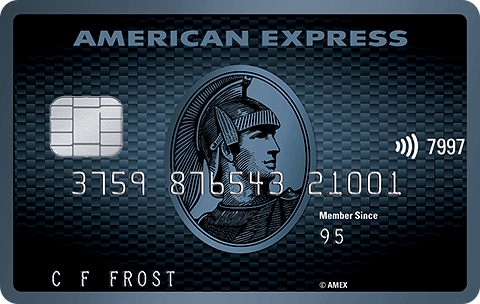
The American Express Explorer ® Credit Card
Summary of changes to your Card
The new insurance Terms and Conditions on your American Express Explorer ® Credit Card will replace your previous Terms and Conditions. The new Terms and Conditions will apply to all claim events occurring on or after 15 March 2022.
Australian Government Restrictions on Travel (including COVID)
You may, in some circumstances, be covered for costs if you need to amend or cancel your trip due to an Australian State or Territory government or the Australian Federal Government or a government agency (such as ‘DFAT’) issuing a ‘Do Not Travel’ warning, or closing borders, after you book your trip. However, no cover is provided:
If the country you’re travelling to is subject to a Government 'Do Not Travel' warning or if borders are closed before your trip starts and you choose to travel anyway. This exclusion applies even if you have an exemption from the Australian government to travel:
For government travel advisories or border closures related to COVID-19 for Domestic Return Trips.
Travel Cover & COVID-19
Cover applies for claim events relating to COVID-19 that occur after 1 November 2021 for certain travel, medical and trip cancellation events. Not all claim events are covered. For full details, please refer to the COVID-19 section within your new Terms and Conditions, which you can find under the New Terms and Conditions tab.
Return Trips Only
You are only eligible for the travel insurance benefits under Sections A – G of this Policy for return Trips i.e. trips that begin and end from Your Home or Work in Australia. It does not cover One-Way Trips where You have no plans to return to Australia. You may need to provide evidence of Your intention to return to Your Home or Your Work where reasonably possible, for example by providing copies of a return ticket, itinerary or schedule, return transfer or accommodation bookings, confirmation of return to Work dates etc.
Summary Only
Information on this page is a summary of the key changes only. The policy wording has also been updated to make it easier to know exactly what you're covered for and how much you can claim under the policy. For full details of the terms, conditions, exclusions and benefit limits that apply, please refer to the new Terms and Conditions here .
It’s also important for you to share this information with any Additional Card Members, at your earliest opportunity.
For information about when you will and won’t be covered when travelling in relation to COVID-19, see below:
Domestic Travel
Cover is provided:
- If you need to amend or cancel your trip because you or your travelling companion, close relative or a person you’re visiting for the main purpose of your trip are diagnosed with COVID-19.
Cover is not provided for:
- Cancellation or trip changes due to border closures or travel advisory warnings related to COVID-19; or
- Medical expenses related to COVID-19.
International Travel
- If you need to amend or cancel your trip as a result of border closures or upgraded travel advisory warnings related to COVID-19 that occur after you have booked your trip.
- For medical expenses you incur if you’re diagnosed with COVID-19 during your trip.
Cover is not provided if:
- The country you’re travelling to is subject to a Government 'Do Not Travel' warning or if borders are closed before your trip starts – even if you have an exemption to travel from the Australian government. However, if you need to amend or cancel your trip due to such a situation, the costs of cancellation and amendment are covered if the warning or border closure occurred after you booked and met the eligibility criteria.
Benefit Exclusions
Claims arising from or caused by COVID-19 will not be paid if:
- You're travelling against a treating Doctor's advice.
- You travel after the Australian government has issued a ‘Do Not Travel’ warning or despite borders being closed, even if you have received an exemption from the Australian government to travel.
- You receive a refund, credit note or voucher for the amounts you’re claiming (for example, if an airline or hotel provide you with a credit refund).
Please refer to 'Important things to Know About This Policy'.
More information has been added under 'Important Things To Know About This Policy', to help you understand what benefits you’re eligible for if travelling while pregnant.
What's covered if you’re travelling overseas while pregnant? If you're pregnant, you'll be covered for unforeseen emergency medical expenses due to an injury or illness, which occurs more than 8 weeks before your estimated date of delivery. However, any medical expenses relating to actual childbirth of your newborn child won’t be covered. Please see ‘Pregnancy and Childbirth Exclusions’ under General Exclusions in your Policy for full details. Should you suffer a sudden and unexpected injury or an illness, which is unrelated to your pregnancy, (for example a broken wrist), you’re eligible for cover under Medical Emergency Expenses Cover or Trip Cancellation and Amendment Cover, subject always to the Policy. Please see 'Important Things To Know About This Policy' for full details.
Smartphone Screen Cover
There are some changes to your cover under Smartphone Screen Cover.
Changes to your Smartphone Screen Cover
- Smartphones paid on a monthly contract no longer need to be contracted for a minimum of 12 months. You only need to have paid your last 3 monthly phone bills on your Card prior to damaging your Smartphone to be eligible for cover.
- There is no cover provided for Smartphones over 3 years old.
Please refer to the ‘Benefits’ section of the Policy for a full overview of the cover, terms, conditions and exclusions that apply.
New Benefits and Cover
The following new benefits and increased limits for existing cover have been made. Please refer to the ‘Benefits’ section for a full overview of the cover, terms, conditions and exclusions that apply.
Changes to qualifying travel purchases for Domestic Returns Trips
Your Travel Insurance cover now includes self-drive road trips where you spend $500 or more on accommodation on your American Express Card. A Domestic Return Trip must be over 150kms radius away from Your Home. Please see Eligibility Table section of the Policy for full details.
Personal Accident Cover
Accidental Death or Permanent Disablement due to injury
Accidental Death or Permanent Disablement cover has been added. Should you suffer an accidental injury on your trip resulting in death or permanent disablement within 12 months of the injury, you’ll now be covered up to $25,000.
Public Transport Accident Cover
The Transport Accident Cover section now sits under the Personal Accident Cover and is known as Public Transport Accident Cover. The benefit limit for dependent children has increased from $20,000 to up to $300,000.
Medical Emergency Expenses Cover
New cover has been added under Medical Emergency Expenses, up to $50 per 24-hour period to a maximum of $3,000 for your out of pocket expenses such as food and toiletries expenses, which you may incur as a result of being hospitalised.
Additional Travel Inconvenience Cover for extended delays
New cover has been added under this section, up to $1,400 for additional accommodation if you're impacted by an extended delay, cancelled, overbooked or missed flight.
Special Event Cover
If you’re delayed for a Special Event, new cover has been added up to $3,000 under Travel Inconvenience to cover the cost of alternative public transport to help you arrive at the Special Event.
Card Refund Cover
Refund Protection Cover is now known as Card Refund Cover.
Card Purchase Cover
Purchase Protection Cover is now known as Card Purchase Cover. Items left unattended in a public place due to an emergency medical, security or evacuation situation will now be covered.
Exclusions and Limitations
Please be aware there have also been changes made that may affect your cover when travelling. The below is an outline of some of the exclusions. It is important that you fully understand this policy’s terms, conditions and limitations and that you review the specific details of exclusion, which are set out in the Terms and Conditions here .
No Cover for Competitive Sports
Cover for competitive sporting events where you receive prize money or a fee is now excluded. Please see the definition of Excluded Sports and Activities in the Definitions Section of the Policy for full details.
No Cover while riding a Motorcycle if you’re unlicensed or not wearing a helmet
You're not covered for claims relating to accidents where you’re riding a motorcycle without a valid motorcycle licence, not wearing a helmet, or exceeding the legal alcohol limit. Please see the General Exclusions in the Policy applicable to all sections.
No Cover for Money stored within personal luggage
You’re not covered for the loss of any money within your personal baggage that’s checked in or stowed in the luggage hold of an airplane, ship, bus or train. Please see exclusions under Personal Baggage, Valuables, Money and Travel Documents Cover for full details.
No Cover for travelling companions 91 years of age or older
Changes have been made to the Trip Cancellation and Amendment Cover to make it clear that you're not covered for the death, injury or unforeseen illness of your travelling companion if they're 91 years of age or older when you made your booking under Exclusions - Trip Cancellation and Amendment Cover.
Resumption of Long International Trip Exclusion
There is no cover for Resumption of Long International Trip arising from or relating to an epidemic, pandemic or outbreak of infectious disease or virus.
Additional Card Members
Additional Card Members will now be covered under Travel Insurance for all our Card products. It’s your responsibility to tell them about the changes to Travel Insurance. If they’re planning to travel, it’s important they review the Policy before they go to ensure they’re fully covered for all the things they intend to do while on holiday.
For claims and general enquiries about the Terms & Conditions, please contact Chubb:
Email: [email protected]
- Telephone: 1800 950 797
(Monday to Friday 9am to 5pm AEST)
This insurance is underwritten by Chubb Insurance Australia Limited ABN 23 001 642 020, AFSL No. 239687 (Chubb) under a group policy held by American Express Australia Limited ®, ABN 92 108 952 085, AFSL No. 291313 (American Express). Chubb and American Express only provide general advice and do not consider your objectives, financial situation or needs. Before deciding whether this product is right for you, please read the Terms and Conditions. A copy of American Express Financial Services Guide can be found here . Eligibility criteria applies. Terms, conditions, exclusions, maximum age limits, pre-existing medical condition exclusions and limits apply as set out in the Terms and Conditions.
What changes are taking place, and why?
There have been some changes made to the Insurance Terms and Conditions included with your Card. They include changes to cover, exclusions, benefit limits, as well as adding new benefits to some Cards. The changes to your policy will come into effect on the 15 March 2022. Please refer to the 'Key Changes’ tab for the list of key changes. Alternatively, you can access the new Terms and Conditions here .
What do I need to be aware of before booking a trip with regards to COVID-19 under the new terms and conditions effective 15 March 2022?
It's always important you review the policy Terms and Conditions before you travel. Are you planning to Travel domestically or internationally?
If domestic: Your policy includes provisions if you need to amend or cancel your trip because you or your travelling companion, close relative, or a person you are visiting as the main purpose of your trip is diagnosed with COVID-19. However, it excludes cancellation or trip changes due to border closures or travel advisory warnings, or medical expenses related to COVID-19.
If international: Your policy includes provisions if you need to amend or cancel your trip because you or your travelling companion, close relative, or a person you are visiting as the main purpose of your trip is diagnosed with COVID-19, or if you need to amend or cancel your trip as a result of border closures that occur after you make your booking.
For more details, please refer to 'Important Things To Know About This Policy' within the new Terms and Conditions effective 15 March 2022.
Do these changes affect existing travel bookings?
If you have travel booked that is due to conclude before 15 March 2022, your coverage remains unaffected by this change. Any travel or claim events occurring on or after this date will be subject to the new Terms and Conditions.
I have a refund, credit note, or voucher (for example, if an airline or hotel provided you with a refund) from a previous booking. Will these changes apply if I use the travel refund, credit note, or voucher to book a new trip?
Yes, these changes will apply to a new trip when:
- No claim has been paid by us with respect to the original trip under your American Express policy; and
- The original trip and the new trip to be booked, for which the travel refund, credit note, or voucher was received, had fulfilled the eligibility or activation requirements for your American Express Card at the time of booking that trip; and
- with the travel refund, credit note, or voucher from the original trip; or
- with a combination of travel refund, credit note, or voucher from the original trip and any other eligible payment method, as applicable.
- Provided that all other Terms and Conditions continue to apply.
Who can I contact for more information on these changes?
For claims and general enquiries about the Insurance Terms and Conditions, please contact Chubb:
- Email: [email protected]
- Overseas Telephone: +61 2 8912 4595
View the new Terms and Conditions here
- Car Finance
- Hire Purchase
- Novated Leasing
- Bad Credit Car Loans
- Car Loan Refinance
- Business Car Loans
- Australian Car Statistics
- Car Loan Repayments Calculator
- Compare Car Loans
- Average Car Loan Interest Rates
- How Much Can I Borrow?
- How to Get a Car Loan?
- Caravan Loans
- Motorbike Loans
- Jet Ski Loans
- Camper Trailer Loans
- Loans for Harley-Davidson
- Boat Loan Calculator
- Caravan Buying Checklist
- How to Choose a Motorbike?
- Top Tips to Choose a Right Boat
- Equipment Finance
- Chattel Mortgage
- Truck Finance
- Aircraft Finance
- Technology Finance
- Agriculture Finance
- Plant & Machinery Finance
- Operating Lease
- Unsecured Personal Loans
- Low-interest Personal Loans
- Debt Consolidation Loans
- Travel Loans
- Wedding Loans
- Bad Credit Loans
- Compare Personal Loans
- Personal Loan Calculator
- Personal Loans Eligibility
- Unsecured Business Loans
- Small Business Loans
- Invoice Financing
- Business Overdrafts
- Cashflow Lending
- Small Business Start-up Loans
- Compare Business Loans
- Business Loan Interest Rates
- First Home Buyers
- Buy Next Home
- Investment Home Loans
- Home Loan Refinance
- Bad Credit Home Loans
- Self Employed
- Construction Home Loans
- Compare Home Loans
- How to Choose a Home Loan?
- Home Loan Repayments Calculator
- Borrowing Power Calculator
- Balance Transfer
- Frequent Flyer
- No Annual Fee
- Master Card vs Visa Card
- Maximise Credit Reward Points
- Perks of Using a Credit Card
- Manage Your Debt with a Balance Transfer Card
- Small Personal Loan
- Quick Cash Loan
- Rental Bond Loan
- Car Repair Loan
- Furniture Loan
- Emergency Loan
- Rent Arrears Loan
- Bank Accounts
- Savings Accounts
- Term Deposits
- Business Bank Accounts
- Debit Cards
- Kids Savings Accounts
- Margin Loans
- Travel Money Cards
- Best International Money Transfers
- Send Money to India
- Send Money to USA
- Send Money to New Zealand
- Send Money to UK
- Send Money to Canada
- Superannuation
- Compare Super Funds
- Cryptocurrency
- Share Trading
- Forex Trading
- CFD Trading
- Comprehensive Car Insurance
- Third Party Fire and Theft Car Insurance
- Third Party Property Damage Car Insurance
- CTP Insurance
- Classic Car Insurance
- Car Insurance for Young Drivers
- Seniors Car Insurance
- How Do I Compare Car Insurance?
- How Much is Car Insurance?
- Types of Car Insurance in Australia
- Market Value Vs Agreed Value
- Car Insurance with Choice of Repairer
- Landlord Insurance
- Building Insurance
- Flood Insurance
- Contents Insurance
- Best Home Insurance
- Cheapest Home Insurance
- Professional Indemnity Insurance
- Public Liability Insurance
- Product Liability Insurance
- Domestic Travel Insurance
- Cruise Travel Insurance
- Single Trip Travel Insurance
- Seniors Travel Insurance
- Best Travel Insurance
- Cheap Travel Insurance
- Travel Insurance for Pre-Existing Conditions
What Does Travel Insurance Cover?
- Why Do I Need Travel Insurance?
- Travel Insurance COVID-19
- Seniors Funeral Insurance
- Hospital Cover
- Extras Only Cover
- Singles Cover
- Couples Cover
- Family Health Insurance Cover
- Overseas Visitors Health Insurance Cover
- Health Insurance for Seniors
- Cheap Health Insurance
- Income Protection
- Personal Accident Insurance
- Trauma Insurance
- TPD Insurance
- Funeral Insurance
- Seniors Pet Insurance
- Cheap Pet Insurance
- Best Pet Insurance
- Electricity Plans
- Compare Electricity Plans
- Compare Gas Plans
- Solar Electricity Plans
- Green Energy Plans
- ADSL Broadband Plans
- Mobile Broadband
- Home Wireless Broadband Plans
- Internet Providers
- Best Broadband Deals
- Prepaid Plans
- iPhone Plans
- Unlimited Data Plans
- SIM-Only Plans
- Unlimited Data for Mobile Phones
- Travel Insurance for Mobile Phone
- Customer Reviews
Home > Travel Insurance > AMEX Travel Insurance Review
AMEX Travel Insurance Review
Learn more about AMEX’s travel insurance policies to find out about their coverage and fees and compare them with other insurers today.
Fact checked
Founded more than 170 years ago in the US city of Buffalo, American Express (also known as AMEX) provides travellers with travel insurance products alongside its usual suite of services for credit cards and corporate banking. In Australia, the company is headquartered in Sydney and employs more than 1,500 people across the country. AMEX’s travel insurance products are underwritten by Chubb.
If you’re hunting for the right travel insurance for your holiday, comparing with Savvy allows you to get an idea of how AMEX’s plans stack up against other offers on the market. You can weigh up factors such as claim limits, inclusions and exclusions and terms and conditions.
Find out more about AMEX’s travel insurance policies, compare them with Savvy and get a quote today.
*Please note that Savvy does not represent AMEX for its travel insurance products.

More about AMEX travel insurance
What travel insurance policies does amex offer.
American Express offers several different travel insurance policies, including:
- International Essentials Plan: this cheaper travel insurance policy covers you for the basics, such as unlimited overseas medical expenses. You’re also given limited cover for your luggage, death due to a covered accident and any legal costs associated with being found personally liable for damage or injury. Those over 80 won’t be able to take out this travel insurance policy.
- International Comprehensive Plan: this policy covers the same ground as the essentials plan. However, there are larger limits on benefits and you’re also covered if you lose income due to illness, injury or travel delays.
- International Ultimate Plan: this is AMEX’s top level of international cover for those taking an international holiday. Essentially, you’re afforded the same areas of cover as the comprehensive policy but the claim limits are considerably higher. For example, while you can claim up to $10,000 in cancellation costs on the comprehensive policy, the ultimate plan allows you to recoup up to $15,000.
- Domestic Trip: if you’re taking a trip around Australia, this policy covers you for cancellation or amendments to your bookings, travel delays, lost or damaged luggage and personal liability. However, you’ll miss out on cover for loss of income or accidental death.
Comparing quotes with Savvy helps you narrow your selections and find the best policy for your next trip, no matter if you’re flying to Costa Rica or Cairns.
What optional extras are available through AMEX?
American Express provides optional coverage to cover travellers taking a range of different domestic and international holidays. Some of the available options include:
- Rental vehicle excess cover: hiring a car can be an easy and efficient way of getting around your destination, whether you’re taking a holiday to Egypt or a drive to Echunga. This add-on covers the excess on your rental vehicle up to $3,000 if your car is damaged, an amount you otherwise would have needed to pay.
- Snow sports cover: anything can happen when you’re carving up the slopes on a set of skis or a snowboard. This optional extra allows you to be covered for the hire or replacement of equipment and any cancellation costs due to bad weather or the closure of your resort.
- Cruise cover: this optional coverage covers you for a range of incidentals while you’re on an international or domestic cruise .
What exclusions should I be aware of when buying travel insurance through AMEX?
American Express has a list of general exclusions which include:
- Changing your mind before the start of your holiday
- Taking a domestic holiday which is less than 150km from your home
- Accidents caused by consuming alcohol or drugs
- Self-inflicted injuries or attempted suicide
- Partaking in a professional sport
- Any costs associated with travel to Cuba
- Travelling to hazardous worksites including mines or oil rigs
- Loss of enjoyment
If you’ve found a policy which draws your eye, ensure you review AMEX’s Product Disclosure Statement (PDS) before you set your decision in stone.
What we think of AMEX travel insurance
What we like, generous personal liability limits.
AMEX offers generous limits on their coverage if you are found personally liable for damage or injury during your holiday, allowing you to claim back up to $5 million.
Free with certain credit cards
If you’re a credit card holder with AMEX, you may qualify for free travel insurance as part of the overall package, potentially saving you money in the process.
Competitive luggage cover
In most cases, travel insurers will only cover up to $10,000 if you need to replace or repair your baggage because it’s damaged or stolen. However, AMEX allows you to claim back up to $15,000.
What we don't like
High excesses.
If you need to make a claim on your travel insurance, you’ll be required to pay a $250 excess, which is $50 to $100 more than those of many other providers.
Shorter pregnancy cover
Many travel insurance providers will cover pregnant travellers up to their 26th week of gestation. However, American Express only covers you up to your 23rd week.
No cover for those over 80
While some travel insurance providers are quite flexible with their age limits, AMEX isn’t and as a result won’t sell policies to travellers over 80.
Types of travel insurance
International.
International travel insurance can offer cover for a range of events, including medical expenses, lost luggage or items, cancellation fees and more when you're overseas and a long way from home.
If you're journeying within Australia, domestic policies are designed to offer many of the same protections as international travel insurance (with the exception of medical expenses).
Single trip
The most standard and common type of travel insurance, this policy can cover you for one trip starting and ending in Australia (and is available for both international and domestic travel).
Annual multi-trip
As the name suggests, this type of travel insurance covers multiple trips over a 12-month period. Depending on your insurer, you may be able to take an unlimited number of trips up to 90 days each.
You don't have to have a return ticket booked to take out cover while you're overseas. One-way travel insurance enables you to access cover without a set end date, such as if you're moving temporarily.
You may need to take out specialist coverage if you're setting sail on a cruise. Fortunately, cruise insurance can cover emergency evacuation, cabin confinement and more.
Just because you're older doesn't mean travel insurance isn't still important. If you qualify for cover, seniors' travel insurance can offer greater peace of mind for included events while you're travelling.
Adding winter sports or ski cover to your policy can add protection against damage to your equipment, piste closure due to bad weather and activities such as back-country skiing, heliskiing and more.
Adventure sports
Looking to enjoy some adventure sports on holiday? An adventure sports pack can grant you cover for a range of activities, such as hiking, scuba diving and motorcycle or scooter riding.
Jetsetting with the whole clan in tow? Some insurers offer family travel insurance, which enables you to include yourself, your partner and your dependent children under one policy to help you save.
If you're travelling interstate or overseas with your partner (or simply another friend or family member), you may be able to access a discount by taking out a joint or duo travel insurance policy.
Why compare travel insurance with Savvy?
Reputable insurance partners, fast and convenient online process.
You can complete the quote, comparison and purchase process online through Savvy quickly and easily.
Competitive quote costs
Regardless of the type of insurance you’re looking for, we can help you compare between competitive quotes.
Frequently asked questions about AMEX travel insurance
Yes – American Express’ travel insurance policies cover costs for cancelling, curtailing or changing your trip due to a positive COVID-19 diagnosis. Policies also cover the cost of any necessary medical treatment you require during your recovery. However, you won’t be covered due to COVID-19-related border closures or able to claim for quarantine costs.
Not necessarily – you can purchase travel insurance through American Express whether you’re an existing credit card customer or not. However, some of their credit products offer complimentary travel insurance. For example, AMEX’s Platinum credit card comes with free travel insurance if you purchase return flights on the card. Among some of the benefits of the Platinum card’s travel insurance are unlimited medical expenses and coverage for loss of luggage.
If you need to file a claim on your travel insurance, AMEX requires you to do so through the website of their underwriter, Chubb. Once you’ve logged onto their portal, you can follow a few simple steps to submit your claim:
- Provide ample details about the incident and the expenses you’re claiming
- Upload the documentation you need for them to back up your claim
- Provide your bank details for your reimbursement
- Review your application and submit it
AMEX says it can take up to ten days for applications to be processed. During this time, you may be requested to provide more information about your claim. Responding promptly is the best way to fast-track the processing of your claim.
The cost of travel insurance varies depending on several factors, including:
- Your date of birth
- Your chosen destination
- The level of coverage you buy
- Any optional extras you need
- The policy excess you choose
- The type of insurer and insurance policy you buy
A single-trip policy covers you for one return trip while an annual multi-trip policy covers you for consecutive holidays taken over 12 months. These annual policies allow you to travel for between 15 and 90 days per trip. A one-way travel insurance policy covers you for taking a holiday when you don’t have a return ticket booked. Under these policies, you can usually opt for an extension of a year on your cover.
More travel insurance reviews

CHI Travel Insurance Review
Learn more about CHI’s travel insurance to find out about their coverage and fees and compare them with other insurers …

RACT Travel Insurance Review
Read Savvy’s review of RACT’s travel insurance offers to find out about their overseas coverage and fees and compare them …

CFMEU Travel Insurance Review
Learn more about CFMEU’s travel insurance policies to find out about their coverage and fees and compare them with other …

Real Insurance Travel Insurance Review
Learn more about Real Insurance’s travel policies to find out about their coverage and fees and compare them with other …

Australian Unity Travel Insurance Review
Learn more about Australian Unity’s travel insurance policies to find out about their coverage and fees and compare them with …

COTA Travel Insurance Review
Learn more about COTA’s travel insurance policies to find out about their coverage and fees and compare them with other …
Helpful travel insurance guides

What Do I Need for Travel Insurance?
Compare with Savvy and find out what you need to purchase travel insurance for your holiday. Compare Travel Insurance Quotes...

How Late Can You Buy Travel Insurance?
Find out how close to your departure you can purchase your policy with Savvy. Compare Travel Insurance Quotes in 30...

Benefits of Travel Insurance
Understand more about the benefits of travel insurance by comparing your options with Savvy. Compare Travel Insurance Quotes in 30...

Need to know what your travel insurance covers? Compare and find out with Savvy today. Compare Travel Insurance Quotes in...

What is a Travel Insurance Excess?
Find out what a travel insurance excess is and how you should compare them here. Compare Travel Insurance Quotes in...

Travel Insurance for Expats
Are you an Australian expatriate chasing travel insurance back home? Compare with Savvy and find the best policy. Compare Travel...

Travel Insurance That Covers Border Closures
Find out if travel insurance policies cover border closures by comparing with Savvy. Compare Travel Insurance Quotes in 30 Seconds...

Best Travel Insurance for Cruises
If you’re chasing travel insurance for your next cruise, compare with Savvy and get the best policy today. Compare Travel...

How to Get a Travel Insurance Quote
Find out how to complete a travel insurance quote and the process involved in Savvy's handy guide. Compare Travel Insurance...

Compare Domestic Travel Insurance
Exploring your own backyard? Compare and find the best domestic travel insurance with Savvy. Compare Travel Insurance Quotes in 30...
Explore your travel insurance options for your next destination
Travel Insurance for Georgia
Travel Insurance for Denmark
Travel Insurance for Pakistan

Travel Insurance for China
Travel Insurance for Portugal
Travel Insurance for Bermuda
Travel Insurance for Azerbaijan
Travel Insurance for Japan
Travel Insurance for Fiji
Travel Insurance for Malaysia
Travel Insurance for Lebanon
Travel Insurance for Tunisia
Travel Insurance for Abu Dhabi
Travel Insurance for Switzerland
Travel Insurance for Italy
Travel Insurance for South Africa
Travel Insurance for Canada
Travel Insurance for Kenya
Travel Insurance for Poland
Travel Insurance for the Middle East
Travel Insurance for Ireland
Travel Insurance for Norfolk Island
Travel Insurance for Hungary
Travel Insurance for Paris
Travel Insurance for Hawaii
Travel Insurance for the Seychelles
Travel Insurance for Bhutan
Travel Insurance for Chile
Travel Insurance for Iceland
Travel Insurance for Argentina
- Giving Back
- Partner with us
- Privacy Policy
- Terms of Use
- Credit Guide
- How We Handle Complaints
- Scam and Fraud Warning
- Comparison Rate Warning
1300 974 066
Sign up to our newsletter.
Quantum Savvy Pty Ltd (ABN 78 660 493 194) trades as Savvy and operates as an Authorised Credit Representative 541339 of Australian Credit Licence 414426 (AFAS Group Pty Ltd, ABN 12 134 138 686). We are one of Australia’s leading financial comparison sites and have been helping Australians make savvy decisions when it comes to their money for over a decade.
We’re partnered with lenders, insurers and other financial institutions who compensate us for business initiated through our website. We earn a commission each time a customer chooses or buys a product advertised on our site, which you can find out more about here , as well as in our credit guide for asset finance. It’s also crucial to read the terms and conditions, Product Disclosure Statement (PDS) or credit guide of our partners before signing up for your chosen product. However, the compensation we receive doesn’t impact the content written and published on our website, as our writing team exercises full editorial independence.
For more information about us and how we conduct our business, you can read our privacy policy and terms of use .
© Copyright 2024 Quantum Savvy Pty Ltd T/as Savvy. All Rights Reserved.
Thanks for your enquiry!
Our consultant will get in touch with you shortly to discuss your finance options.

We'd love to chat, how can we help?
Your guide to Amex's travel insurance coverage

Update : Some offers mentioned below are no longer available. View the current offers here .
American Express premium credit cards offer some of the best perks in the credit card space. While lounge access and travel credits are typically the highlights of these cards, some of the lesser-known benefits, such as trip delay reimbursement and trip cancellation and interruption insurance, are becoming hot topics as the coronavirus pandemic continues to impact the travel industry.
Want more credit card news and advice from TPG? Sign up for our daily newsletter!
As a result, many TPG readers have sent in questions about Amex's travel insurance protections. As travel restrictions change, policies and best practices will likely change as well. But this guide will walk you through which Amex credit cards have these benefits, what's currently covered and how you can file a successful claim.
Related: Best credit cards for trip cancellation and interruption insurance
Amex cards offering trip delay, cancellation or interruption insurance
Here is an overview of the Amex cards that offer trip delay reimbursement, trip cancellation/interruption insurance or both:
The information for the Hilton Aspire Amex card and American Express Corporate Platinum Card has been collected independently by The Points Guy. The card details on this page have not been reviewed or provided by the card issuer.
Related: The best credit cards with travel insurance
What is covered by trip cancellation and interruption insurance?

You can find the full terms and conditions of what is generally covered on your respective card in your Guide to Benefits, which can be found through your online account. I'll use the Delta SkyMiles® Reserve as an example.
Here is a rundown of the "covered losses" provided by Amex's trip cancellation and interruption insurance:
- Accidental bodily injury or loss of life or sickness of either the eligible traveler, traveling companion or a family member of the eligible traveler or traveling companion
- Inclement weather, which prevents a reasonable and prudent person from traveling or continuing on a covered trip
- The eligible traveler or his or her spouse's change in military orders
- Terrorist action or hijacking
- Call to jury duty or subpoena by the courts, either of which cannot be postponed or waived
- The eligible traveler or traveling companion's dwelling made uninhabitable
- Quarantine imposed by a physician for health reasons
Related: Book carefully if you have multiple Amex cards that offer travel protections
Amex also provides an extensive list of things that are not covered by trip cancellation/interruption insurance:
- Pre-existing conditions
- The eligible traveler's suicide, attempted suicide or intentionally self-inflicted injury
- A declared or undeclared war
- Mental or emotional disorders, unless hospitalized
- The eligible traveler's participation in a sporting activity for which he or she receives a salary or prize money
- The eligible traveler's being intoxicated at the time of an accident. Intoxication is defined by the laws of the jurisdiction where such accident occurs
- The eligible traveler being under the influence of any narcotic or other controlled substance at the time of an accident, unless the narcotic or other controlled substance is taken and used as prescribed by a Physician
- The eligible traveler's commission or attempted commission of any illegal or criminal act, including but not limited to any felony
- The eligible traveler parachuting from an aircraft
- The eligible traveler engaging or participating in a motorized vehicular race or speed contest
- Dental treatment except as a result of accidental bodily injury to sound, natural teeth
- Any non-emergency treatment or surgery, routine physical examinations
- Hearing aids, eyeglasses or contact lenses
- One-way travel that does not have a return destination
- A counterfeit scheduled airline or train ticket; or a scheduled airline or train ticket which is charged to a fraudulently issued or fraudulently used eligible card.
- Any occurrence while the eligible traveler is incarcerated
- Loss due to intentional acts by the eligible traveler
- Financial insolvency of a travel agency, tour operator or travel supplier
- Any expenses that are not authorized and reimbursable by the eligible traveler's employer if the eligible traveler makes the purchases with a commercial card
If you do find yourself canceling or cutting a covered trip short, here are the basic guidelines provided by Amex on what types of expenses are covered for trip cancellation/interruption:
"If a Covered Loss causes an Eligible Traveler's Trip Interruption, we will reimburse you for the nonrefundable amount paid to a Travel Supplier with your Eligible Card for the following: 1. The forfeited, non-refundable, pre-paid land, air and sea transportation arrangements that were missed; and 2. Additional transportation expenses that the Eligible Traveler incurs less any available refunds, not to exceed the cost of an economy-class air ticket by the most direct route for the Eligible Traveler to rejoin his or her places of origin.
If a Covered Loss causes an Eligible Traveler to temporarily postpone transportation by Common Carrier for a Covered Trip and a new departure date is set, we will reimburse you for the following: 1. The additional expenses incurred to purchase tickets for the new departure (not to exceed the difference between the original fare and the economy fare for the rescheduled Covered Trip by the most direct route); and 2. The unused, non-refundable land, air, and sea arrangements paid to a Travel Supplier with your Eligible Card."
What is covered by trip delay insurance?

Trip delay coverage provides reimbursement for reasonable additional expenses incurred when your trip is delayed due to a covered hazard for more than six hours.
Coverage is limited to $500 per trip and cardmembers are only eligible for two claims each 12 consecutive month period.
Amex outlines what is not covered, which includes the following:
- Covered losses that are made public or known to the eligible traveler prior to the departure for the covered trip
- An eligible traveler's expenses paid prior to the covered trip
Filing a claim
When you have a delay or trip cancellation/interruption that you think qualifies for coverage, you can file a claim by calling Amex at 1-844-933-0648 within 60 days of the covered loss.
Trip delay reimbursement requires the following documentation:
- Proof of loss – You must furnish written proof of loss to Amex within 180 days after the date of your loss
- Receipts - Acceptable documentation includes the following:
- A statement from the common carrier that the covered trip was delayed
- Charge receipt
- Copies of common carrier ticket(s)
- Receipts for travel expenses
Trip cancellation/interruption insurance requires slightly different documentation.
- Proof of loss – You must furnish written proof of loss to Amex within 180 days after the date of your loss. Acceptable documentation includes:
- Court subpoenas, orders to report for active duty, physician orders, etc.
- Copies of your common carrier tickets and travel supplier receipt
- Your eligible card billing statement showing the charges for the covered trip
- Copy of travel supplier's cancelation policy
After Amex receives notice of your claim, instructions will be sent on how to send the proof. Typically, you have up to 180 days to file a claim after a delay or cancellation.
Proof of flight delay or cancellation
One of the documents required to file for trip delay reimbursement is a verification form that outlines the reason for the delay or cancellation by the carrier. You can typically get this at the airport when the delay or cancellation is announced, but keep in mind that it may require a supervisor. Each U.S. major airline also has a process for requesting this information after the fact.
Here is an overview of the process that major U.S. airlines require for you to receive a delay or cancellation verification form:
Amex cards that offer car rental insurance
Unfortunately, no American Express credit cards offer primary car rental coverage, although most offer secondary coverage. You can see the entire list of cards that offer secondary car rental protection on the American Express website . However, all American Express credit cards offer an optional "Premium Car Rental Protection policy" that can be added to rentals made using the card for a small fee.
Read our guide on when to use American Express' Premium Car Rental Protection for more details on this coverage option.
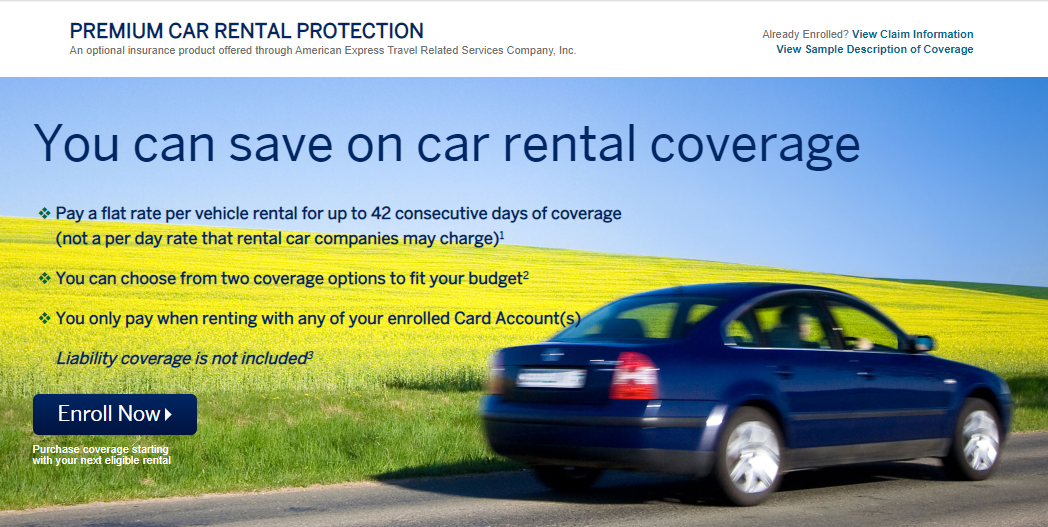
You can add Premium Car Rental Protection to any American Express card . TPG has a guide of the best American Express cards , but here are some of the best cards in terms of the return you could receive when renting a car. Note, the estimated return rate for these cards is based on TPG's latest valuations:
- Hilton Honors American Express Aspire Card: $450 annual fee (see rates and fees); 4.2% return on car rentals booked directly from car rental companies; no foreign transaction fees (see rates and fees)
- The Blue Business® Plus Credit Card from American Express: $0 annual fee (see rates and fees); 4% return on general spending on the first $50,000 in purchases per calendar year and 1x thereafter; 2.7% foreign transaction fee (see rates and fees)
- The Amex EveryDay® Preferred Credit Card from American Express: $95 annual fee; 3% return on general spending in billing cycles where you make 30+ purchases; 2.7% foreign transaction fee
The information for the Amex EveryDay Preferred card has been collected independently by The Points Guy. The card details on this page have not been reviewed or provided by the card issuer.
Amex cards that offer baggage insurance

If you're a frequent traveler, you've likely run into this situation at some point (it's the worst). Over the years, airlines have been working on improving the baggage system by introducing live bag tracking. Regardless, it's still a smart idea to have some protections in place, like baggage insurance.
Related: Everything you need to know about Amex's baggage insurance plan
This is why you need to pay attention to the benefits each of your travel rewards cards offers. Nearly all of Amex's premium rewards cards offer baggage insurance. You can check out the full list of cards and details on American Express's website.
The types of losses it covers: You're covered for losses resulting from damaged, stolen or lost baggage, including both carry-on and checked bags.
When you're covered: To be eligible for coverage, you have to travel on a common carrier, which Amex defines as any air, land or water vehicle (other than a personal or rental vehicle) that is licensed to carry passengers for hire and available to the public. Your rental car, as well as taxis and ride-share services such as Uber and Lyft, would be excluded from this protection.
To receive coverage, you also need to pay for the entire fare with an eligible American Express card or by using Membership Rewards points to book tickets through Amex Travel . Trips booked with miles from other sources — even the cobranded Delta SkyMiles cards from Amex — are excluded. Your trip also isn't covered if you used a combination of miles and dollars unless the miles came from a Membership Rewards transfer. This is a welcome change. A few years ago, a TPG staffer found out the hard way that Amex's policy didn't cover frequent flyer mile awards.
Who's covered: This policy covers both primary and additional cardholders, as well as cardmembers' spouses or domestic partners and any dependent children under 23 years old. In addition, travelers must be permanent residents of one of the 50 states, Washington, D.C., Puerto Rico and the U.S. Virgin Islands.
How much it covers: Most American Express credit cards will cover replacement costs for checked bags and their contents up to $500 per person, although so-called "high-risk items" are only covered for a maximum of $250. These items include jewelry, sporting equipment, photographic or electronic equipment, computers and audio/visual equipment. Carry-on bags are covered for up to $1,250, which is good to know since your belongings could be stolen from the overhead bins.
You'll enjoy additional coverage if you use The Platinum Card from American Express, The Business Platinum Card from American Express, the Platinum Card from American Express Exclusively for Mercedes-Benz and Morgan Stanley-branded Platinum Card (but not the Delta SkyMiles® Platinum American Express Card).
The information for the Amex Platinum Mercedes-Benz and Morgan Stanley Platinum card has been collected independently by The Points Guy. The card details on this page have not been reviewed or provided by the card issuer.
Amex cards that offer medical assistance

One of the lesser known benefits of some of Amex's most premium cards is its Premium Global Assistance. This benefit can quite literally be a lifesaver if you or an immediate family member run into any unexpected issues or accident on your trip. For example, this service can help you arrange emergency medical referrals.
All Amex cards have access to Amex's Global Assist Hotline, but the Premium Global Assist Hotline and higher level of coverage are reserved exclusively for the Amex's premium cards:
- The Platinum Card from American Express
- The Business Platinum Card from American Express
- American Express Corporate Platinum Card
- Hilton Honors Aspire Card from American Express
- Delta SkyMiles® Reserve American Express Card
- Delta SkyMiles® Reserve Business American Express Card
- Marriott Bonvoy Brilliant® American Express® Card
- American Express Centurion Card
- American Express Business Centurion Card
The information for the Amex Centurion and Amex Business Centurion cards has been collected independently by The Points Guy. The card details on this page have not been reviewed or provided by the card issuer.
Bottom line
Having a card with trip insurance can save you hundreds of dollars when unexpected hiccups happen in your travel plans. Still, it can be confusing to know what is covered and the right documentation you need to file a claim.
Nothing is worse than getting through an entire claims process only to be denied or have to start over because you don't have the required documentation for the insurance provider. Before you start filing a claim, make sure you have the documents listed above. Keep in mind that a provider may ask for additional documentation related to the incident, so you may have to collect receipts and other forms to help your case.
If you're starting to travel again, it's also a good idea to consider booking refundable travel . Some airlines and hotels even waive cancelation fees and/or change fees for certain fares, which can make last-minute adjustments in the case of emergencies.
Additional reporting by Stella Shon and Madison Blancaflor.
For rates and fees of the Amex Platinum card, please click here. For rates and fees of the Amex Gold card, please click here. For rates and fees of the Amex Business Gold card, please click here. For rates and fees of the Amex Green card, please click here. For rates and fees of the Hilton Aspire card, please click here. For rates and fees of the Amex Blue Business Plus card, click here. For rates and fees of the Marriott Bonvoy Brilliant card, click here. For rates and fees of the Delta SkyMiles Reserve card, please click here. For rates and fees of the Delta SkyMiles Reserve Business card, please click here. For rates and fees of the Delta SkyMiles Platinum card, please click here. For rates and fees of the Amex Business Platinum card, click here.
- United States
- United Kingdom

American Express Travel Insurance Review
Our verdict: american express travel insurance covers all the basics but excludes pre-existing medical conditions so if you have one, you might want to look elsewhere..
In this guide
Summary of American Express International Comprehensive policy
How does american express travel insurance cover covid-19, what policies does american express offer, here's a breakdown of american express travel insurance features, standard features, optional add-ons, how to make an american express travel insurance claim, here's the bottom line about american express travel insurance, frequently asked questions, request travel insurance quotes and compare policies.
Destinations
- American Express makes claiming easy, with an online portal, email and phone options.
- The loss of income benefit is particularly strong, paying a monthly benefit of up to $2,000 for a maximum of 5 months if you're seriously injured while on holiday and subsequently unable to work.
- Pre-existing medical conditions are excluded and there's no option to add them on for an additional fee. Even American Express warns that its policy might not be right for travellers with pre-existing medical conditions.
- Even the most comprehensive American Express policy, Ultimate Plan, has a $20,000 limit on cancellation costs. There are many brands which offer unlimited cancellation cover .
Compare other options
Table updated August 2023
American Express has you covered if you're diagnosed with COVID-19 before you head on holiday or while you're away. Here's what you can expect:
- Any costs incurred from having to cancel, delay or change your trip because you or a travelling companion are diagnosed with COVID-19 - that includes additional accommodation and travel expenses.
- Overseas emergency medical costs if you need treatment for COVID0-19 while on your trip
- Transport of your remains or burial costs if you die as a result of COVID-19 during your trip.
There are some scenarios that are not covered by American Express including costs incurred as a result of mandatory quarantine or isolation, border closures or government travel bans.
Also, if you were diagnosed with COVID-19 before heading on your trip but you went anyway, you won't be covered for any COVID-related overseas medical expenses.
American Express offers four insurance policies to travellers. The Essential, Comprehensive and Ultimate plans are available to travellers heading overseas while the Domestic plan is for travellers staying in Australia.

Comprehensive

The insurer of this product is Chubb Insurance Australia Limited. It comes with a cooling-off period of 14 days and choice of $200 standard excess for international plans.

These are some of the main insured events that American Express will cover. These benefits apply across all international policies.
- Overseas medical treatment
- Lost, damaged or stolen property
- Trip cancellation or amendment
- Additional accommodation and transport
- Theft of money
- Luggage and travel delay
- Kidnap and hijack
- Personal liability
- Accidental death

American Express also offers three add-ons that provide cover for a wider range of risks.
- Rental vehicle excess cover. If your rental vehicle is damaged, this benefit will cover the cost of the insurance excess. Does not apply to campervans, motorbikes or scooters.
- Snow Sports Cover. Cover for equipment and cancellation expenses if you're going skiing, snowboarding, tobogganing or snowmobiling. .
- Cruise Cover Extends your insurance policy to cover cruises and any cruise-related claim.

Unfortunately, travel insurance doesn't cover everything. Generally, American Express will not pay your claim if it relates to:
- Unlawful, wreckless or unreasonably unsafe behaviour by you
- Behaviour while you were drunk or under the influence of drugs
- Expenses related to a pre-existing medical condition
- An act of war, invasion or revolution
- Insolvency of a travel agent , tour operator or accommodation provider
- Mandatory quarantines or isolations
- You being unfit to travel or travelling against medical advice
- Childbirth or pregnancy complications after the 24th week of gestation or if you have had previous pregnancy complications
- A multiple pregnancy or one where the conception was medically assisted
- An elective medical or dental treatment , cosmetic procedure or body modification (including tattoos or piercing)
- Self-inflicted injury or illness, suicide or attempted suicide
Make sure you review the American Express PDS for a detailed breakdown of what won't be covered, found under its list of general exclusions .
You can submit your claim online via the Chubb Claims Centre for American Express .
Alternatively, you can phone Chubb on 1800 139 149, Monday to Friday, 9am to 5pm AEST.
Travellers with pre-existing medical conditions might want to look elsewhere as they won't be covered by policies and American Express won't consider adding them for an extra fee.
Further, there appears to be no cover available for travellers wishing to ride a motorbike or scooter, even if you have a valid licence.
If you're still not sure about American Express, you can compare other travel insurance companies here .
How long do I have to make a travel insurance claim?
You have 60 days from your return date to submit your travel insurance claim. If you're still waiting on documentation to support your claim but worried you won't make the deadline, you can start the process and submit the additional documentation later.
Is there an age limit for American Express travel insurance?
Yes, American Express does not offer travel insurance to people over 80. However, there are plenty of other providers that offer travel insurance to over 80s ..
Do I have to have an American Express credit card to get American Express travel insurance?
No, you do not have to be an American Express customer to take out a travel insurance policy.
Use a comma or space to separate ages. Add kids under the age of 1 by typing a “0” 0 traveller(s)
Include travel deals and helpful personal finance content from Finder
By submitting this form, you agree to our Privacy & Cookies Policy and Terms of Service

Nicola Middlemiss
Nicola Middlemiss is a contributing writer at Finder, with a special interest in personal finance and insurance. Formerly a business and finance journalist, Nicola has written thousands of articles helping Australians better understand insurance and grow their personal wealth. She has contributed to a wide range of publications, including Domain, the Educator, Financy, Fundraising and Philanthropy, Insurance Business, MoneyMag, Mortgage Professional, Yahoo Finance, Your Investment Property, and Wealth Professional. Nicola has a Tier 1 General Insurance (General Advice) certification and a Bachelor's degree from the University of Leeds.
More guides on Finder
The best travel insurance policies are different for each individual traveller.
We take a look to see if you are fully protected by insurance if your Airbnb trip goes wrong.
South Korea has become a tourist hotspot in recent years, and is usually a very safe choice if you travel smart.
Everything you need to know about taking your pet overseas including rules for flying with pets and how to prepare for your trip.
Find out how travel insurance for trip disruption actually works and policies from Australian brands.
Find out how travel insurance covers accidental death and what will be paid from in the event of a claim.
Beware when swimming at Byron, Ballina, Bondi and Bells.
Learn more about travel insurance brokers, how they are paid and the way they can help you find comprehensive travel cover.
Is travel insurance a worthy investment? Find out why travel insurance is an invaluable travel item.
Guide to high-risk travel insurance: What is and isn't covered.
Ask a Question
Click here to cancel reply.
You are about to post a question on finder.com.au:
- Do not enter personal information (eg. surname, phone number, bank details) as your question will be made public
- finder.com.au is a financial comparison and information service, not a bank or product provider
- We cannot provide you with personal advice or recommendations
- Your answer might already be waiting – check previous questions below to see if yours has already been asked
24 Responses
We are planning a trip to Switzerland and Italy June 2019 for about 3 weeks. My mother has just turned 85 and still lives independently at her home. Would we be covered if during our time away, she passed away and we needed to fly home? She has the normal age related issues but does not have any other issues other than old age. We have heard that a lot of insurers do not cover this. Thanks
Thank you for getting in touch with Finder.
The American Express travel insurance offer cover in case of death of a relative during the trip.
If you are looking for a travel insurance that can help you recover your cancellation costs including pre-booked tickets and hotels, costs associated with returning home at short notice and costs associated with resuming your journey at a later date due to family/relative emergency at home, please refer to our travel insurance for family emergency to start comparing your options.
I hope this helps.
Please feel free to reach out to us if you have any other enquiries.
Thank you and have a wonderful day!
Cheers, Jeni
Hi I’m heading to Bali and wondering if your Ultimate policy cover the Volcano if it goes off
Thank you for your question.
You have contacted finder.com.au, a comparison and information service and not actually an American Express Travel Insurance.
American Express Travel Insurance covers medical emergency expense cover, travel cancellation cover, transport accident cover, travel inconvenience insurance and baggage, money and documentation cover.
It would be best to contact American Express directly as this would require for you to check the complete coverage of the insurance.
Hope this helps!
Best regards,
Is AMEX Travel Insurance available for Cruise travel to an Island within Australia?
Thank you for your inquiry.
According to the American Express Travel Insurance product disclosure statement (PDS), “cover for any cruise travel will be based on Your chosen geographical region.” Meaning that you should be covered by your standard policy. However, you should review the PDS for the exact costs covered for cruise related claims. For more information about the costs covered by AMEX or the definitions related to Australian waters, you should contact them directly.
I hope this information has helped.
Cheers, Harold
Do you insure travellers age 80 and 93
American Express Travel Insurance has different age limits for different policies:
- Ultimate and comprehensive policies have a maximum age limit of 89 years old.
- Essential policy has a maximum age limit of 79 years old.
- Basic policy has a maximum age limit of 69 years old.
- Domestic policy has a maximum age limit of 79 years old.
If you would like to check which insurers provide cover for 80 and 93 year old travelers, please head to our seniors travel insurance page.
All the best, Zubair
I am a 45yo male and had a stroke just over 12 months ago. Although my stroke was not for medical reasons (I have no risk factors) and I have been advised by my neurologist that everything has healed and I now have no more likelihood of having another stroke than the average person, it is still considered a pre-existing condition by the insurers I have spoken with. Are you aware of any travel insurance policies that would provide me with cover?
Thanks for your question. Both Cover-More and InsureandGo consider most conditions after a medical assessment. They may be a good starting point.
I hope this was helpful, Richard
How likely would you be to recommend finder to a friend or colleague?
Our goal is to create the best possible product, and your thoughts, ideas and suggestions play a major role in helping us identify opportunities to improve.
Important information about this website
Advertiser disclosure.
finder.com.au is one of Australia's leading comparison websites. We are committed to our readers and stands by our editorial principles
We try to take an open and transparent approach and provide a broad-based comparison service. However, you should be aware that while we are an independently owned service, our comparison service does not include all providers or all products available in the market.
Some product issuers may provide products or offer services through multiple brands, associated companies or different labeling arrangements. This can make it difficult for consumers to compare alternatives or identify the companies behind the products. However, we aim to provide information to enable consumers to understand these issues.
How we make money
We make money by featuring products on our site. Compensation received from the providers featured on our site can influence which products we write about as well as where and how products appear on our page, but the order or placement of these products does not influence our assessment or opinions of them, nor is it an endorsement or recommendation for them.
Products marked as 'Top Pick', 'Promoted' or 'Advertisement' are prominently displayed either as a result of a commercial advertising arrangement or to highlight a particular product, provider or feature. Finder may receive remuneration from the Provider if you click on the related link, purchase or enquire about the product. Finder's decision to show a 'promoted' product is neither a recommendation that the product is appropriate for you nor an indication that the product is the best in its category. We encourage you to use the tools and information we provide to compare your options.
Where our site links to particular products or displays 'Go to site' buttons, we may receive a commission, referral fee or payment when you click on those buttons or apply for a product. You can learn more about how we make money .
Sorting and Ranking Products
When products are grouped in a table or list, the order in which they are initially sorted may be influenced by a range of factors including price, fees and discounts; commercial partnerships; product features; and brand popularity. We provide tools so you can sort and filter these lists to highlight features that matter to you.
Terms of Service and Privacy Policy
Please read our website terms of use and privacy policy for more information about our services and our approach to privacy.
- Credit cards
- View all credit cards
- Banking guide
- Loans guide
- Insurance guide
- Personal finance
- View all personal finance
- Small business
- Small business guide
- View all taxes
The Guide to American Express Travel Insurance

Many or all of the products featured here are from our partners who compensate us. This influences which products we write about and where and how the product appears on a page. However, this does not influence our evaluations. Our opinions are our own. Here is a list of our partners and here's how we make money .
Table of Contents
American Express travel insurance vs. coverage provided by AmEx cards
Complimentary travel insurance provided by amex cards.
Trip cancellation and interruption insurance
Trip delay insurance
Car rental loss and damage insurance
Baggage insurance
Premium global assist.
Global Assist Hotline
Standalone American Express travel insurance plans
Should you use the complimentary benefits or purchase a policy, amex travel insurance recapped.
You can get AmEx travel insurance via your card or as a standalone policy.
AmEx cards typically include coverage for trip delays, interruptions, cancellations, baggage and car rentals.
Coverage tends to be secondary.
Policies vary by card.
American Express has two different types of travel insurance offerings: standalone travel insurance plans that customers can purchase and travel insurance that is included as a complimentary benefit on certain cards.
So if you’re thinking about getting travel insurance before a trip, get familiar with American Express travel insurance benefits that are included on your credit cards. Knowing what protections you already have will prevent you from spending money on a separate policy with benefits that overlap.
A standalone travel insurance policy from American Express may offer more robust coverage, but depending on your needs, the travel insurance perks provided by your AmEx card may be sufficient.
If you primarily want specific coverage for cancellations, delays or rental cars and baggage, it’s likely your card will be enough.
If, however, you’re mainly concerned with emergency health coverage while traveling , you’re better off with a separate medical insurance policy because the benefits provided by credit cards are limited in those areas. You can purchase this from American Express directly or shop around other travel insurance companies .
» Learn more: How to find the best travel insurance
There are six travel insurance benefits offered on many American Express cards:
Trip cancellation and interruption insurance .
Trip delay insurance .
Car rental loss and damage insurance .
Baggage insurance plans .
Premium Global Assist Hotline .
Global Assist Hotline .
Here's a closer look at each.

Trip cancellation will protect you if you need to cancel your trip for a covered reason (more below), and you will be reimbursed for any nonrefundable amounts paid to a travel supplier with your AmEx card. Bookings made with Membership Reward Points are also eligible for reimbursement. Travel suppliers are generally defined as airlines, tour operators, cruise companies or other common carriers.
Trip interruption coverage applies if you experience a covered loss on your way to the point of departure or after departure. AmEx will reimburse you if you miss your flight or incur additional transportation expenses due to the interruption. American Express considers the following to be covered reasons:
Accidental injuries.
Illness (must have proof from doctor).
Inclement weather.
Change in military orders.
Terrorist acts.
Non-postponable jury duty or subpoena by a court.
An event occurring that makes the traveler’s home uninhabitable.
Quarantine imposed by a doctor for medical reasons.
There are many reasons that are specifically called out as not covered (e.g., preexisting conditions, war, self-harm, fraud and more), so we recommend checking the terms of your coverage carefully.
If you want a higher level of coverage for trip cancellation, consider purchasing Cancel For Any Reason (CFAR) travel insurance . CFAR is an optional upgrade available on some standalone travel insurance plans. This supplementary benefit allows you to cancel a trip for any reason and get a partial refund of your nonrefundable deposit.
Alternately, if you want what essentially amounts to CFAR insurance on your flights specifically, purchase your fares through the AmEx Travel portal and tack on Trip Cancel Guard for an extra fee. Trip Cancel Guard guarantees you an up to 75% refund on nonrefundable airfare costs when you cancel at least two days before departure, regardless of why. This isn't as comprehensive as other CFAR policies, but it can add some peace of mind for people who want the cash back (as opposed to a travel credit) for flights they may not take.
AmEx cards with trip cancellation, interruption coverage
The following American Express credit cards offer trip cancellation and trip interruption coverage:
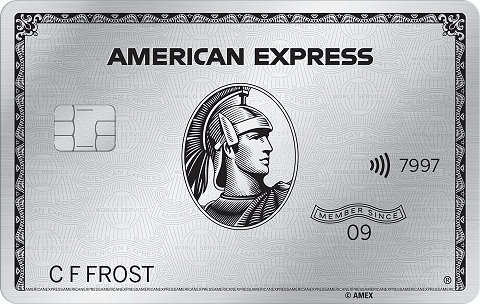
on American Express' website
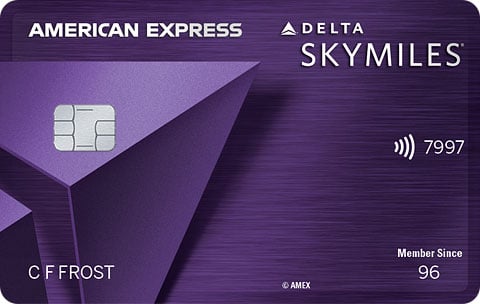
Additional AmEx cards that offer trip cancellation and interruption coverage include:
The Business Platinum Card® from American Express .
Centurion® Card from American Express.
Business Centurion® Card from American Express.
The Corporate Centurion® Card from American Express.
The Platinum Card® from American Express for Ameriprise Financial.
The American Express Platinum Card® for Schwab.
The Platinum Card® from American Express for Goldman Sachs.
The Platinum Card® from American Express for Morgan Stanley.
Corporate Platinum Card®.
Delta SkyMiles® Reserve Business American Express Card .
Terms apply.
Covered amount
The maximum benefit amount for Trip Cancellation and Interruption Insurance is $10,000 per Covered Trip and $20,000 per Eligible Card per 12 consecutive month period. Coverage is secondary and applies after your primary policy provides reimbursement. Claims must be filed within 60 days. To start a claim, call 844-933-0648.
This benefit will reimburse you for reasonable, additional expenses incurred if a trip is delayed by a certain number of hours. Examples of eligible expenses include meals, lodging, toiletries, medication and other charges that are deemed appropriate by American Express. It makes sense to use your judgment in terms of what will get approved based on your policy's fine print.
Acceptable delays include those that are caused by weather, terrorist actions, carrier equipment failure, or lost/stolen passports or travel documents. There are also plenty of exclusions, such as intentional acts by the traveler.
AmEx cards with trip delay insurance
The reimbursable amount depends on which card you hold.
Up to $500 per Covered Trip that is delayed for more than 6 hours; and 2 claims per Eligible Card per 12 consecutive month period.
Up to $300 per Covered Trip that is delayed for more than 12 hours; and 2 claims per Eligible Card per 12 consecutive month period.
As expected, the more premium travel credit cards offer higher compensation for shorter delays. Trip delay insurance is offered on the following American Express credit cards:
When you decline the collision damage waiver offered by the car rental agency, you will be covered if the car is damaged or stolen through your AmEx Travel Insurance. Depending on the card you have, the coverage is $50,000 or $75,000.
» Learn more: How AmEx car rental insurance works
In addition, the cards offering car rental damage and theft insurance up to of $75,000 also provide secondary benefits:
Accidental death or dismemberment coverage.
Accidental injury coverage.
Car rental personal property coverage.
To qualify, you must decline the personal accident coverage and personal effects insurance provided by your car rental company.
The entire rental must be charged on the American Express credit card to receive coverage for car rental loss and damage. And keep in mind that you do still need liability insurance when making your rental car reservation (you may have this through your personal auto insurance policy), as these credit card-provided coverage options don't include personal liability.
AmEx cards with car rental coverage
American Express lists over 50 different cards on its site that come with one of the two forms of car rental insurance. Cards that link to the Tier 1 policies are the $50,000-coverage cards, and Tier 2 policies are the $75,000 cards.
Car Rental Loss and Damage Insurance can provide coverage up to $75,000 for theft of or damage to most rental vehicles when you use your eligible Card to reserve and pay for the entire eligible vehicle rental and decline the collision damage waiver or similar option offered by the Commercial Car Rental Company. This product provides secondary coverage and does not include liability coverage. Not all vehicle types or rentals are covered. Geographic restrictions apply.
Car Rental Loss and Damage Insurance can provide coverage up to $50,000 for theft of or damage to most rental vehicles when you use your eligible Card to reserve and pay for the entire eligible vehicle rental and decline the collision damage waiver or similar option offered by the Commercial Car Rental Company. This product provides secondary coverage and does not include liability coverage. Not all vehicle types or rentals are covered. Geographic restrictions apply.
The amount reimbursed is calculated as whichever is lowest:
The cost to repair the rental car.
The wholesale book value (minus salvage and depreciation).
The invoice purchase price (minus salvage and depreciation).
Here are some key exclusions to be aware of with this coverage:
These policies don't cover theft or damage that was caused by a driver’s illegal operation of the car, operation under the influence of drugs/alcohol or damage caused by any acts of war.
Policies don't cover drivers not named as "authorized drivers" on your rental agreement.
The benefit only covers car rentals up to 30 consecutive days.
Not all cars are included in the policy. Certain trucks, vans, limousines, motorcycles and campers are excluded from coverage.
Insurance protection doesn't apply in Australia, Italy, New Zealand and any country subject to U.S. sanctions .
You can file a claim online or call toll-free in the U.S. at 800-338-1670. From overseas, call collect 216-617-2500. Your claim must be filed within 30 days of the loss. Additionally, some benefits vary by state, so check the policy for your specific card.
» Learn more: The guide to AmEx Platinum’s rental car insurance
As an American Express cardholder, you are eligible to receive compensation if your luggage is lost or stolen. This benefit is in addition to what you may receive from the carrier. However, the AmEx policy is secondary, which means that it kicks in after the carrier provides any compensation for losses.
AmEx provides this insurance to "covered persons," who are defined as:
The cardmember.
Their spouse or domestic partner.
Their dependent children who are under 23 years old (there are age exceptions for handicap children).
Some business travelers (Tier 2 coverage only).
To qualify, all covered individuals need to be traveling on the same reservation and must be residents of the U.S., Puerto Rico or the U.S. Virgin Islands.
AmEx cards with baggage insurance
Naturally, the higher-end cards offer more protection — but even the basic cards have decent coverage. The compensation limits per person are as follows (note that the maximum payout per covered person for lost luggage is $3,000 on all of these cards).
Below are the limits for cardholders of the The Platinum Card® from American Express , The Business Platinum Card® from American Express , The American Express Platinum Card® for Schwab, The Platinum Card® from American Express for Goldman Sachs, The Platinum Card® from American Express for Morgan Stanley, Hilton Honors American Express Aspire Card , Marriott Bonvoy Brilliant™ American Express® Card, Centurion® Card from American Express and Business Centurion® Card from American Express:
Baggage in-transit to/from common carrier: $3,000.
Carry-on baggage: $3,000.
Checked luggage: $2,000.
Combined maximum: $3,000.
High-end items: $1,000.
Disclosure: Baggage Insurance Plan coverage can be in effect for Covered Persons for eligible lost, damaged, or stolen Baggage during their travel on a Common Carrier Vehicle (e.g. plane, train, ship, or bus) when the Entire Fare for a ticket for the trip (one-way or round-trip) is charged to an Eligible Card. Coverage can be provided for up to $2,000 for checked Baggage and up to a combined maximum of $3,000 for checked and carry on Baggage, in excess of coverage provided by the Common Carrier. The coverage is also subject to a $3,000 aggregate limit per Covered Trip. For New York State residents, there is a $2,000 per bag/suitcase limit for each Covered Person with a $10,000 aggregate maximum for all Covered Persons per Covered Trip.
And here are the coverage limits for cardholders of the American Express® Gold Card , American Express® Business Gold Card , American Express® Green Card , Business Green Rewards Card from American Express , Hilton Honors American Express Surpass® Card , Marriott Bonvoy™ American Express® Card, Marriott Bonvoy Business® American Express® Card , Delta SkyMiles® Reserve American Express Card , Delta SkyMiles® Reserve Business American Express Card , Delta SkyMiles® Platinum American Express Card , Delta SkyMiles® Platinum Business American Express Card , Delta SkyMiles® Gold American Express Card and Delta SkyMiles® Gold Business American Express Card , The Hilton Honors American Express Business Card :
Baggage in-transit to/from common carrier: $1,250.
Carry-on baggage: $1,250.
Checked luggage: $500.
High-end items: $250.
Disclosure: Baggage Insurance Plan coverage can be in effect for Eligible Persons for eligible lost, damaged, or stolen Baggage during their travel on a Common Carrier (e.g. plane, train, ship, or bus) when the entire fare for a Common Carrier Vehicle ticket for the trip (one-way or round-trip) is charged to an eligible Account. Coverage can be provided for up to $1,250 for carry-on Baggage and up to $500 for checked Baggage, in excess of coverage provided by the Common Carrier (e.g. plane, train, ship, or bus). For New York State residents, there is a $10,000 aggregate maximum limit for all Covered Persons per Covered Trip.
AmEx also offers limited reimbursement for high-end items (coverage varies by card), such as:
Sports equipment.
Photography or electronic equipment.
Computers and audiovisual equipment.
Wearable technology.
Furs (including items made mostly of fur and those trimmed/lined with fur).
Items made fully or partially of gold, silver or platinum.
Claims must be filed within 30 days of your baggage loss. To file a claim, call 800-645-9700 from the U.S. or collect to 303-273-6498 if overseas. You can also file a claim online.
» Learn more: Compare travel insurance options: airline or credit card?
This benefit helps with events like replacing a lost passport, missing luggage assistance, emergency legal and medical referrals, and in some instances, emergency medical transportation assistance.
The service can also help you figure out important travel-related details like customs information, currency information, travel warnings, tourist office locations, foreign exchange rates, vaccine recommendations for the country you’re visiting, passport/visa requirements and weather forecasts.
AmEx cards with Premium Global Assist
Premium Global Assistance is offered on the following American Express credit cards:
The Platinum Card® from American Express .
Delta SkyMiles® Reserve American Express Card .
Hilton Honors American Express Aspire Card .
Marriott Bonvoy Brilliant™ American Express® Card.
Services provided by Premium Global Assist Hotline
You can rely on Global Assist Hotline 24 hours a day / 7 days a week for medical, legal, financial or other select emergency coordination and assistance services while traveling more than 100 miles away from your home. Plus, the Premium Global Assist Hotline may provide emergency medical transportation assistance and related services. Third-party service costs may be your responsibility.
The hotline isn’t so much a concierge as a service that provides logistical assistance, which can include the following:
General travel advice
Emergency translation if you need an interpreter to help with legal or medical documents (cost isn't covered).
Lost item search if your belongings are lost while traveling.
Missing luggage assistance if an airline loses your luggage. The hotline will contact your airline on a daily basis on your behalf to help locate your bags.
Passport/credit card assistance if your credit card or passport is lost or stolen.
Urgent message relay if you need to contact a family member and/or friend in the event of an emergency.
Medical assistance
Emergency medical transportation assistance if the cardmember or another covered family member traveling on the same itinerary gets sick or injured and needs medical treatment (there are many conditions for this coverage; review your policy’s fine print).
Physician referral if you need a doctor or dentist (cardmember is responsible for costs).
Repatriation of remains in the event of death.
Financial assistance
Emergency wire service to get help obtaining cash (fees will be reimbursed).
Emergency hotel check in/out if your card has been lost or stolen.
Legal assistance
Bail bond assistance if you need access to an agency that accepts AmEx (cardmember is responsible for paying bail bond fees).
Embassy and consulate referral if you need help finding or accessing local embassies.
English-speaking lawyer referral if you’re traveling and need a list of available attorneys (cardmember is responsible for any legal fees).
To use this benefit, call the Premium Global Assist Hotline toll-free at 800-345-AMEX (2639). You can also call collect at 715-343-7979.
The main difference between the Global Assist Hotline and the Premium version is that some of the services that are fully covered by Premium Global Assist aren't covered in the more basic version (cited examples include emergency medical transportation assistance and repatriation of mortal remains).
You can rely on Global Assist Hotline 24 hours a day / 7 days a week for medical, legal, financial or other select emergency coordination and assistance services while traveling more than 100 miles away from your home. Third-party service costs may be your responsibility.
AmEx cards with Global Assist Hotline access
The Global Assist Hotline is available to holders of the following cards:
American Express® Gold Card .
American Express® Business Gold Card .
American Express® Green Card .
Business Green Rewards Card from American Express .
Delta SkyMiles® Platinum American Express Card .
Delta SkyMiles® Platinum Business American Express Card .
Delta SkyMiles® Gold American Express Card .
Delta SkyMiles® Gold Business American Express Card .
Delta SkyMiles® Blue American Express Card .
Hilton Honors American Express Surpass® Card .
Hilton Honors American Express Card .
The Hilton Honors American Express Business Card .
Marriott Bonvoy™ American Express® Card.
Marriott Bonvoy Business® American Express® Card .
The Amex EveryDay® Preferred Credit Card from American Express .
Amex EveryDay® Credit Card .
Blue Cash Preferred® Card from American Express .
The American Express Blue Business Cash™ Card .
The Blue Business® Plus Credit Card from American Express .
You can call the Global Assist Hotline toll-free at 800-333-AMEX (2639), or collect at 715-343-7977.
If you don’t have any of the credit cards above and are thinking about purchasing a policy from American Express or just simply want to price compare to see if you get better perks by purchasing a policy, you can go to the AmEx travel insurance website and input your trip plans to build a quote. You’ll need to provide your departure and return date, state of residence, age of traveler, number of travelers covered by the policy and the trip cost per traveler. Then, you can select the option of choosing a package or building your own.
To see which plans are available, we input a sample $3,000, one-week trip by a 35-year-old from South Dakota. Our search result yielded four different plans ranging from $59 for a Basic plan to $208 for a Platinum plan.
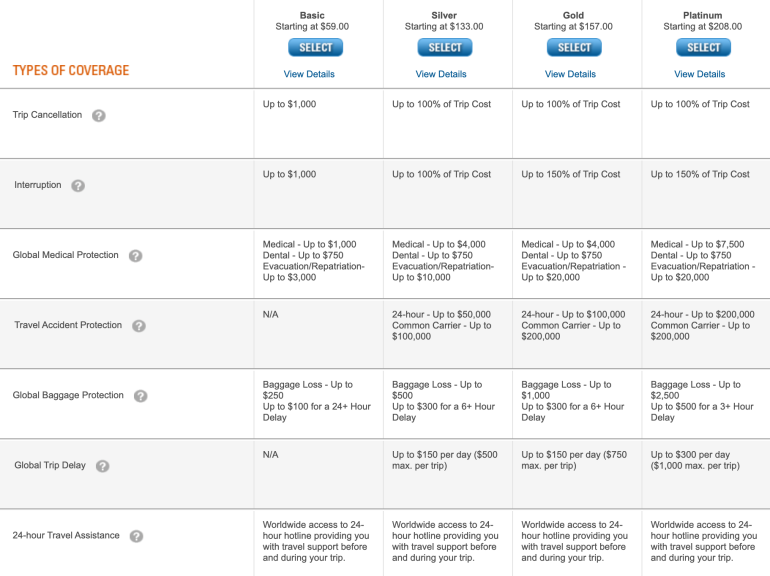
Global medical protection (not included on AmEx cards)
Medical protection includes coverage for emergency healthcare and dental costs as well as medical evacuation and repatriation of remains . The limits increase as the plans become more expensive. Although AmEx cards offer an array of travel insurance benefits, medical coverage isn't included. So if medical protection benefits are important to you, a standalone travel insurance policy is what you’ll want to look for.
Travel accident protection (not included on AmEx cards)
Another benefit not included with AmEx cards is travel accident protection. This benefit provides coverage in case of death or dismemberment while traveling . Although this is a topic no one wants to think about, it's good to be familiar with this coverage. While travel accident protection isn’t offered on the Basic plan, all of the higher plans offer it.
Standalone policy benefits that are also included on AmEx cards
These elements of coverage are offered on the AmEx cards mentioned, although in some, the limits may be higher or lower.
Trip cancellation
The Basic plan only covers a trip up to $1,000, however, all the other plans cover 100% of the trip cost. To compare this with the perks included as a benefit on the cards, all AmEx cards that include trip cancellation coverage provide up to $10,000 per covered trip.
Keep in mind that, all the cards included have annual fees and the card with the lowest fee is the Hilton Honors American Express Aspire Card , with a $550 annual fee.
Trip interruption
Trip interruption coverage ranges from $1,000 on a Basic plan to 150% of trip cost on the Gold and Platinum plans. The trip interruption benefit offered by the AmEx cards is included on all the same cards that offer trip cancellation insurance, with the trip interruption limit capped at $10,000 per covered trip.
Global baggage protection
If your luggage is lost or stolen this benefit will provide monetary compensation to reimburse you for your lost items. AmEx cards offer baggage coverage as a complimentary benefit, with the higher-end cards naturally providing higher limits. Interestingly, the cards with the lower annual fees (i.e. Hilton Honors American Express Surpass® Card , annual fee $150 ) have a high limit as well, offering a total combined limit for lost luggage of $3,000, which is higher than the coverage offered by the standalone Platinum plan.
Global trip delay
If your trip is delayed, you’re eligible for reimbursement of any necessary expenses incurred up to a specific limit. The Basic plan doesn’t offer this benefit, but all the other plans do, with the Platinum plan providing up to $300 per day (maximum of $1,000 per trip). This coverage is also included on the higher-end AmEx cards.
AmEx cards offer key travel insurance benefits: trip cancellation and interruption insurance, trip delay insurance, car rental loss and damage insurance, baggage insurance, Premium Global Assist Hotline (or Global Assist Hotline). However, they don't offer any sort of emergency medical coverage. This is pretty typical of travel credit cards, as the travel insurance perks they offer don't provide coverage for emergency health care costs.
If you’re looking for emergency medical coverage, you’ll need to purchase a separate policy, such as the standalone one offered by American Express. The other limits provided in the American Express travel insurance policy are comparable to what you get on the AmEx cards, so it makes sense to shop around to make sure that the benefits you’re paying for are sufficient for your needs.
» Learn more: What to know about American Express Platinum travel insurance
Yes, if you have one of the cards listed above. If you have a credit card that isn’t listed in this guide or the card is no longer available by American Express, call the number on the back of your card for more information. Generally, AmEx offers a number of travel insurance benefits on its credit cards that shouldn't be overlooked.
Yes, but it depends on which card you have. To qualify for reimbursement, the trip cancellation must be for a covered reason. Refer to the section "Trip Cancellation and Interruption Insurance" for a list of cards and explanations of covered reasons.
American Express offers a solid range of travel insurance protection across its credit cards, with the premium cards providing the most coverage. However, if you need insurance benefits with higher limits, we recommend purchasing a separate travel insurance policy . If you only need emergency medical coverage , there are policies that provide that as well.
Call the number on the back of your card to ask for guidance. Some benefits may require authorization from American Express before coverage kicks in, so make sure you follow all the correct steps for reimbursement.
Refer to the AmEx credit card policy for the specific benefit because it will include instructions for submitting a claim. If you cannot find the policy, you should call the customer service number on the back of your American Express card for more assistance.
Yes. American Express offers travel insurance as a benefit of some of its cards, but it also sells standalone coverage that you can purchase out-of-pocket. The latter tends to be more comprehensive and customizable to your needs.
No, you do not get automatic travel insurance with American Express. It is available as a benefit on certain cards. Refer to your terms and conditions to learn if you are covered.
American Express cards do not include medical coverage; instead, you will want to purchase a standalone travel insurance policy with medical protections, such as repatriation of remains or medical evacuation coverage .
American Express offers a solid range of travel insurance protection across its credit cards, with the premium cards providing the most coverage. However, if you need insurance benefits with higher limits, we recommend purchasing a
separate travel insurance policy
. If you only need
emergency medical coverage
, there are policies that provide that as well.
American Express cards do not include medical coverage; instead, you will want to purchase a standalone travel insurance policy with medical protections, such as
repatriation of remains or medical evacuation coverage
American Express travel insurance offers a wide array of benefits, especially on its premium cards. Knowing what benefits are available to you is important in the event of unforeseen circumstances. Determine whether an individual policy is a better fit for your risk tolerance than coverage that is included on an eligible card, then go from there.
Eligibility and Benefit level varies by Card. Terms, Conditions and Limitations Apply.
Please visit americanexpress.com/benefitsguide for more details.
Underwritten by New Hampshire Insurance Company, an AIG Company.
Underwritten by AMEX Assurance Company.
Baggage insurance plans
Please visit americanexpress.com/benefit sguide for more details.
Premium Global Assist Hotline
If approved and coordinated by Premium Global Assist Hotline, emergency medical transportation assistance may be provided at no cost. In any other circumstance, Card Members may be responsible for the costs charged by third-party service providers.
Card Members are responsible for the costs charged by third-party service providers.
How to maximize your rewards
You want a travel credit card that prioritizes what’s important to you. Here are our picks for the best travel credit cards of 2024 , including those best for:
Flexibility, point transfers and a large bonus: Chase Sapphire Preferred® Card
No annual fee: Bank of America® Travel Rewards credit card
Flat-rate travel rewards: Capital One Venture Rewards Credit Card
Bonus travel rewards and high-end perks: Chase Sapphire Reserve®
Luxury perks: The Platinum Card® from American Express
Business travelers: Ink Business Preferred® Credit Card

on Chase's website
1x-10x Earn 5x total points on flights and 10x total points on hotels and car rentals when you purchase travel through Chase Travel℠ immediately after the first $300 is spent on travel purchases annually. Earn 3x points on other travel and dining & 1 point per $1 spent on all other purchases.
60,000 Earn 60,000 bonus points after you spend $4,000 on purchases in the first 3 months from account opening. That's $900 toward travel when you redeem through Chase Travel℠.

1x-5x 5x on travel purchased through Chase Travel℠, 3x on dining, select streaming services and online groceries, 2x on all other travel purchases, 1x on all other purchases.
60,000 Earn 60,000 bonus points after you spend $4,000 on purchases in the first 3 months from account opening. That's $750 when you redeem through Chase Travel℠.

1x-2x Earn 2X points on Southwest® purchases. Earn 2X points on local transit and commuting, including rideshare. Earn 2X points on internet, cable, and phone services, and select streaming. Earn 1X points on all other purchases.
50,000 Earn 50,000 bonus points after spending $1,000 on purchases in the first 3 months from account opening.

- Best Travel Insurance 2024
- Cheapest Travel Insurance
- Trip Cancellation Insurance
- Cancel for Any Reason Insurance
- Seniors' Travel Insurance
- Annual Travel Insurance
- Cruise Insurance
- COVID-19 Travel Insurance
- Travel Medical Insurance
- Medical Evacuation Insurance
- Pregnancy Travel Insurance
- Pre-existing Conditions Insurance
- Mexico Travel Insurance
- Italy Travel Insurance
- France Travel Insurance
- Spain Travel Insurance
- Canada Travel Insurance
- UK Travel Insurance
- Germany Travel Insurance
- Bahamas Travel Insurance
- Costa Rica Travel Insurance
- Disney Travel Insurance
- Schengen Travel Insurance
- Is travel insurance worth it?
- Average cost of travel insurance
- Is airline flight insurance worth it?
- Places to travel without a passport
- All travel insurance guides
- Best Pet Insurance 2024
- Cheap Pet Insurance
- Cat Insurance
- Pet Dental Insurance
- Pet Insurance That Pays Vets Directly
- Pet Insurance For Pre-Existing Conditions
- Pet Insurance with No Waiting Period
- Paw Protect Review
- Spot Pet Insurance Review
- Embrace Pet Insurance Review
- Healthy Paws Pet Insurance Review
- Pets Best Insurance Review
- Lemonade Pet Insurance Review
- Pumpkin Pet Insurance Review
- Fetch Pet Insurance Review
- Figo Pet Insurance Review
- CarePlus by Chewy Review
- MetLife Pet Insurance Review
- Average cost of pet insurance
- What does pet insurance cover?
- Is pet insurance worth it?
- How much do cat vaccinations cost?
- How much do dog vaccinations cost?
- All pet insurance guides
- Best Business Insurance 2024
- Business Owner Policy (BOP)
- General Liability Insurance
- E&O Professional Liability Insurance
- Workers' Compensation Insurance
- Commercial Property Insurance
- Cyber Liability Insurance
- Inland Marine Insurance
- Commercial Auto Insurance
- Product Liability Insurance
- Commercial Umbrella Insurance
- Fidelity Bond Insurance
- Business Personal Property Insurance
- Medical Malpractice insurance
- California Workers' Compensation Insurance
- Contractor's Insurance
- Home-Based Business Insurance
- Sole Proprietor's Insurance
- Handyman's Insurance
- Photographer's Insurance
- Esthetician's Insurance
- Salon Insurance
- Personal Trainer's Insurance
- Electrician's Insurance
- E-commerce Business Insurance
- Landscaper's Insurance
- Best Credit Cards of 2024
- Best Credit Card Sign-Up Bonuses
- Best Instant Approval Credit Cards
- Best Cash Back Credit Cards
- Best Rewards Credit Cards
- Best Credit Cards for Bad Credit
- Best Balance Transfer Credit Cards
- Best College Student Credit Cards
- Best 0% APR Credit Cards
- Best First Credit Cards
- Best No Annual Fee Cards
- Best Travel Credit Cards
- Best Hotel Credit Cards
- Best American Express Cards
- Best Amex Delta SkyMiles Cards
- Best American Express Business Cards
- Best Capital One Cards
- Best Capital One Business Cards
- Best Chase Cards
- Best Chase Business Cards
- Best Citi Credit Cards
- Best U.S. Bank Cards
- Best Discover Cards
- Amex Platinum Card Review
- Amex Gold Card Review
- Amex Blue Cash Preferred Review
- Amex Blue Cash Everyday Review
- Capital One Venture Card Review
- Capital One Venture X Card Review
- Capital One SavorOne Card Review
- Capital One Quicksilver Card Review
- Chase Sapphire Reserve Review
- Chase Sapphire Preferred Review
- United Explorer Review
- United Club Infinite Review
- Amex Gold vs. Platinum
- Amex Platinum vs. Chase Sapphire Reserve
- Capital One Venture vs. Venture X
- Capital One Venture X vs. Chase Sapphire Reserve
- Capital One SavorOne vs. Quicksilver
- Chase Sapphire Preferred vs. Capital One Venture
- Chase Sapphire Preferred vs. Amex Gold
- Delta Reserve vs. Amex Platinum
- Chase Sapphire Preferred vs. Reserve
- How to Get Amex Pre-Approval
- Amex Travel Insurance Explained
- Chase Sapphire Travel Insurance Guide
- Chase Pay Yourself Back
- CLEAR vs. TSA PreCheck
- Global Entry vs. TSA Precheck
- Costco Payment Methods
- All Credit Card Guides
- Citibank Savings Account Interest Rate
- Capital One Savings Account Interest Rate
- American Express Savings Account Interest Rate
- Western Alliance Savings Account Interest Rate
- Barclays Savings Account Interest Rate
- Discover Savings Account Interest Rate
- Chase Savings Account Interest Rate
- U.S. Bank Savings Account Interest Rate
- Marcus Savings Account Interest Rate
- Synchrony Bank Savings Account Interest Rate
- Ally Savings Account Interest Rate
- Bank of America Savings Account Interest Rate
- Wells Fargo Savings Account Interest Rates
- SoFi Savings Account Interest Rate
- Best Savings Accounts & Interest Rates
- Best High Yield Savings Accounts
- Best 7% Interest Savings Accounts
- Best 5% Interest Savings Accounts
- Savings Interest Calculator
- Emergency Fund Calculator
- Pros and Cons of High-Yield Savings Accounts
- Types of Savings Accounts
- Checking vs Savings Accounts
- Average Savings by Age
- How Much Should I Have in Savings?
- How to Make Money
- How to Save Money
- Compare Best Checking Accounts
- Compare Online Checking Accounts
- Best Business Checking Accounts
- Compare Best Teen Checking Accounts
- Best Student Checking Accounts
- Best Joint Checking Accounts
- Best Second Chance Checking Accounts
- Chase Checking Account Review
- Bluevine Business Checking Review
- Amex Rewards Checking Account Review
- E&O Professional Liability Insurance
- Best Savings Accounts & Interest Rates
- All Insurance Guides
- Australia Travel Insurance
On This Page
- Key takeaways
Australia travel information & requirements
Do i need travel insurance to visit australia, what does travel insurance for australia cover, what isn’t covered by travel insurance for australia, how much does travel insurance for australia cost, tips for getting the best australia travel insurance, australia travel insurance faqs, related topics.
Australia Travel Insurance: Trip Info & Quotes for U.S. Visitors
- To travel to Australia, you must have a valid U.S. passport , but you don’t need a visa.
- The Australian government doesn’t require American tourists to purchase travel insurance, but it’s wise to have at least medical and medical evacuation coverage since your U.S. health insurance won’t work in Australia .
- In addition to medical emergencies, travel insurance can also cover things like trip cancellations, trip interruptions and rental car damage .
- According to our research, our top picks for travel insurance for Australia come from Travel Insured, Travelex and Faye ( skip ahead to view these plans ).
- We recommend using an online comparison tool to find the best travel insurance policy to suit your needs.
Whether you want to explore the Outback or attend an opera in Sydney, there’s always a chance that something will go wrong during a trip to Australia. To protect yourself, we recommend purchasing travel insurance tailored to your unique needs.
We created this guide to help you understand:
- Why you might need travel insurance during your Australian vacation
- What travel insurance covers
- How much travel insurance costs for a trip to Australia
- How to select a comprehensive travel insurance policy
Our top picks for the best australia travel insurance
- Travel Insured International: Best for Robust Coverage
- Travelex Insurance Services: Best for Basic Medical Coverage
- Faye Travel Insurance: Best for Digital Claims Process & App
Our top picks for travel insurance for Australia
Travel insured international, travelex insurance services, faye travel insurance.
Are there COVID-19 restrictions for U.S. tourists?
No. Australia has no COVID-19-related restrictions for American travelers. However, the Australian government does recommend getting the COVID-19 vaccine, wearing masks and practicing good hygiene.
Do I need a visa or passport to travel to Australia?
Yes. You need a valid U.S. passport with at least one blank page for your entry stamp.

Is it safe to visit Australia?
The United States and Australia have a strong diplomatic relationship. Although there’s always some level of risk involved in traveling to a foreign country, Australia is generally safe for Americans. The U.S. Department of State has issued a Level 1 travel advisory , indicating that you don’t need to take any special safety precautions when visiting the “Land Down Under.”
Australia doesn’t require U.S. tourists to buy travel insurance, but we highly recommend purchasing a comprehensive policy before your trip commences.
Below are some risks you may encounter that would make purchasing travel insurance worthwhile .
Risks with adventure activities
Australia is one of the best places to visit if you love parasailing, paragliding, hot air ballooning, diving and other adventure activities. Unfortunately, these activities are risky, so there’s a chance that you’ll break a bone or sustain some other type of injury.
Travel insurance covers medical expenses and other costs associated with these injuries, ensuring you don’t end up with a huge hospital bill. This type of insurance is especially helpful if you plan to explore the Great Barrier Reef, take an excursion into the Outback or swim near the shoreline of one of Australia’s beautiful beaches.
Risks due to wildlife
Australia is full of dangerous critters, from venomous spiders and snakes to aggressive kangaroos. Depending on where you visit, you may end up encountering an unfriendly Tasmanian devil. U.S. medical insurance typically doesn’t work in Australia, so it’s important to have travel insurance for these unexpected situations. If you’re bitten by a Tasmanian devil or sustain some other wildlife-related injury, travel insurance takes the place of your regular medical insurance.
Risks due to bushfires
Bushfires have a high heat output and can cause a significant amount of damage in a short amount of time. If you find yourself in Australia during one of these fires, you may have to contend with damage to your rental car or your personal belongings. Comprehensive travel insurance may reimburse you for damaged or destroyed items, or it may reimburse your rental car agency for the cost of repairing or replacing a damaged vehicle.
Risks related to long-distance driving
Australia has many isolated regions that are hundreds of miles from the nearest populated area. You may have to drive several hundred miles to reach your destination, so it’s important to have travel insurance before you set off on an adventure.
Travel insurance covers a wide range of circumstances, including the ones below.
Trip cancellation insurance
It’s never fun to cancel a vacation you’ve been looking forward to for months, but it’s even worse when a cancellation results in significant financial losses. Trip cancellation insurance protects you if you have to cancel your trip to Australia for a covered reason. For example, if one of your travel companions is diagnosed with advanced cancer before your departure date, you can use your insurance to recoup pre-paid, nonrefundable expenses.
If you want to have coverage for any type of circustance, you can purchase cancel for any reason (CFAR) insurance . Typically sold as an add-on, this type of coverage will reimburse you for around 50% to 70% of your total prepaid costs .
Trip delay insurance
To get to Australia, you may have to rely on the services of multiple common carriers. For example, you may have to fly to Australia and then take a ferry to your final destination. Trip delay insurance reimburses you for any expenses you incur as the result of a common carrier delay. If your flight is canceled, for example, your insurer may reimburse you for meals, additional transportation costs and other related expenses.
Trip interruption insurance
Imagine that you arrive in Australia, enjoy a few days of fun and then come down with a severe illness. You’re so sick that you have to return to the United States sooner than expected. Trip interruption insurance reimburses your pre-paid, nonrefundable expenses in this type of scenario. It should also cover the cost of adjusting your travel plans or accessing emergency assistance services.
Travel medical insurance
As noted previously, you probably won’t be able to use your U.S. health insurance in Australia . Therefore, it’s important to have travel medical insurance to cover things like nursing care, hospitalization, blood tests, CT scans and other healthcare services. If you’re injured while snorkeling or suddenly develop appendicitis during your trip, you can rest easy knowing that your medical expenses are covered.
Medical evacuation insurance
If you’re injured in the Outback, you can’t exactly hop in a cab and get to a hospital within a few minutes. Medical evacuation insurance covers the cost of transporting you to a healthcare facility that’s capable of meeting your needs. For example, if you need emergency assistance, your policy may cover the cost of air medical services (like helicopter transportation).
Insurance for personal items
We recommend that you leave your valuables at home, but if you just have to take jewelry, designer clothing or expensive sports equipment on your trip, make sure your travel insurance includes coverage for lost, stolen and damaged items. This type of coverage reimburses you if a common carrier loses or damages your luggage or its contents.
Rental car coverage
Rental car coverage can protect you under the following circumstances:
- You’re involved in an auto accident caused by someone else.
- Someone vandalizes your rental vehicle.
- Someone steals your rental vehicle.
If your policy includes this type of coverage, your insurer will reimburse the rental agency any time you experience a covered loss. For example, if you get into a fender-bender in one of Sydney’s famous traffic jams, your insurance company should reimburse the rental agency for the cost of repairs.
Travel insurance for Australia doesn’t cover the following:
- Pre-existing conditions: If you’re diagnosed with a medical condition like asthma or diabetes before you buy your travel insurance, your insurer won’t pay for medical expenses associated with that diagnosis. In some cases, however, you can opt for a plan with a waiver. This can ensure coverage for pre-existing conditions during your trip.
- Illegal activities: Travel insurance doesn’t cover expenses arising from any illegal activities, such as injuries that occur while under the influence of illicit substances.
- Fear of travel: If you book a trip and then suddenly develop a fear of flying, your insurance company won’t reimburse you for your pre-paid expenses. The same applies to a fear of seeing a spider or encountering a Tasmanian devil during your trip.
- Expected events: Travel insurance doesn’t cover expenses associated with events that you knew about (or should have known about) before a trip. For example, if you book a trip and buy insurance after a named storm has started developing, your insurer won’t reimburse you if the storm forces you to cancel or interrupt your trip.
For a trip to Australia, we found that the cost of travel insurance ranges from less than $1 per day to around $11 per day depending on the type of coverage.
To give you a better idea, we requested multiple quotes from leading travel insurance providers.
These quotes are based on the following criteria:
- Age: 35 years old
- Destination: Australia
- Trip Length: 7 days
- Trip cost: $2,000
You can see our quotes for basic travel insurance in the following table. The cheapest travel insurance plan costs just under $1 per day .
Example Where Plan Doesn’t Reimburse the Full Trip Cost
The plans in this next table are more comprehensive. In addition to medical and medical evacuation coverage, they also include trip cancellation and trip interruption coverage. According to our quotes, these plans cost between $7 and $11 per day .
Example Where Plan Does Reimburse the Full Trip Cost
Your costs won’t be exactly the same, as insurance companies base their premiums on these factors:
- Trip cost: Insurance companies reimburse you for up to 100% of your prepaid, nonrefundable expenses. The more your trip costs, the more your insurance provider has to pay you if you experience a covered loss. Therefore, the cost of your insurance plan depends on the cost of your trip.
- Age: Older people are more likely to develop serious medical problems while traveling, so it costs more to insure a 60-year-old or 70-year-old traveler than it does to insure someone in their 20s.
- Insurance benefits: Some travel insurance plans come with more benefits than others. For example, a plan that offers $1 million in medical evacuation coverage will cost more than a plan that comes with only $100,000 in medical evacuation coverage.
- Destination: Some destinations are riskier than others, so insurance companies charge different rates based on your itinerary.
- Add-on coverage: You may need to purchase add-on coverage, such as insurance for adventure activities. If so, you’ll pay an additional premium for the extra benefits.
To find the best travel insurance for your needs, follow these tips:
Consider how you’re getting to and around Australia.
You’ll have to take an airplane from the United States to Australia, but depending on your plans, you may also need to ride a train or take a ferry at some point. The more carriers you use, the more likely you are to experience delays and other problems, increasing the amount of coverage needed.
Think carefully about what you plan to do.
If you want to visit the Sydney Opera House and check out the Australian Museum, you won’t need as much coverage as someone who plans to camp in the Outback or go parasailing over the Gold Coast. You may also want to limit your cancellation costs by purchasing cancel-for-any-reason coverage.
Time your purchase carefully.
Although you can buy Overseas Visitors Cover when you arrive, it’s typically cheaper to purchase travel insurance well in advance of your trip.
What travel insurance do I need to travel to Australia?
You’re not required to purchase travel insurance for Australia, but we highly recommend that you do. You never know when you’re going to have an emergency or encounter some kind of problem during a trip. To find the right policy to suit your needs, try using an online comparison tool .
Does American health insurance work in Australia?
In most cases, no. Medicare and Medicaid only work in the United States, and most private health insurance companies will only cover expenses if you use U.S. medical facilities.
Can foreigners buy travel insurance in Australia?
When you travel to Australia, you have the option of buying Overseas Visitors Cover. However, not many companies provide this type of coverage. There may also be waiting periods for medical coverage. Therefore, we recommend that you buy travel insurance before you leave the United States.

Leigh Morgan is a seasoned personal finance contributor with over 15 years of experience writing on a diverse range of professional legal and financial topics. She specializes in subjects like navigating the complexities of insurance, savings, zero-based budgeting and emergency fund development.
In the last 5 years, she’s authored over 300 articles for credit unions, digital banks, and financial professionals. Morgan is also the author of “77 Tips for Preventing Elder Financial Abuse,” a book focused on helping caregivers protect the elderly from financial scams.
In addition to her writing skills, she brings real-world financial acumen thanks to her previous experience managing rental properties as part of a $34 million real estate portfolio.
Explore related articles by topic
- All Travel Insurance Articles
- Learn the Basics
- Health & Medical
- Insurance Provider Reviews
- Insurance by Destination
- Trip Planning & Ideas

Best Travel Insurance Companies & Plans in 2024
Best Medical Evacuation Insurance Plans 2024

Best Travel Insurance for Seniors

Best Cruise Insurance Plans for 2024

Best COVID-19 Travel Insurance Plans for 2024

Best Cheap Travel Insurance Companies - Top Plans 2024

Best Cancel for Any Reason (CFAR) Travel Insurance

Best Annual Travel Insurance: Multi-Trip Coverage

Best Travel Medical Insurance - Top Plans & Providers 2024

- Is Travel Insurance Worth It?

Is Flight Insurance Worth It? | Airlines' Limited Coverage Explained

Guide to Traveling While Pregnant: Pregnancy Travel Insurance

10 Romantic Anniversary Getaway Ideas for 2023

Best Travel Insurance for Pre-Existing Medical Conditions April 2024

22 Places to Travel Without a Passport in 2024

Costa Rica Travel Insurance: Requirements, Tips & Safety Info

Best Spain Travel Insurance: Top Plans & Cost

Best Italy Travel Insurance: Plans, Cost, & Tips

Best Travel Insurance for your Vacation to Disney World

Chase Sapphire Travel Insurance Coverage: What To Know & How It Works

2024 Complete Guide to American Express Travel Insurance
Schengen Travel Insurance: Coverage for your Schengen Visa Application

Mexico Travel Insurance: Top Plans in 2024

Best Places to Spend Christmas in Mexico this December

Travel Insurance to Canada: Tips & Quotes for US Visitors
Best Travel Insurance for France Vacations in 2024
Travel Insurance for Germany: Tourist Information & Tips

Best UK Travel Insurance: Coverage Tips & Plans April 2024

Travel Insurance for Trips to the Bahamas: Tips & Safety Info

Europe Travel Insurance: Your Essential Coverage Guide

Best Trip Cancellation Insurance Plans for 2024
What Countries Require Travel Insurance for Entry?

Philippines Travel Insurance: Coverage Requirements & Costs

Travel Insurance for the Dominican Republic: Requirements & Tips
Travel Insurance for Trips Cuba: Tips & Safety Info
AXA Travel Insurance Review April 2024

Travel Insurance for Thailand: US Visitor Requirements & Tips

Travel Insurance for a Trip to Ireland: Compare Plans & Prices

Travel Insurance for a Japan Vacation: Tips & Safety Info

Faye Travel Insurance Review April 2024

Travel Insurance for Brazil: Visitor Tips & Safety Info

Travel Insurance for Bali: US Visitor Requirements & Quotes

Travel Insurance for Turkey: U.S. Visitor Quotes & Requirements

Travel Insurance for India: U.S. Visitor Requirements & Quotes

Generali Travel Insurance Review April 2024

Travelex Travel Insurance Review for 2024

Tin Leg Insurance Review for April 2024

Travel Insured International Review for 2024

Seven Corners Travel Insurance Review April 2024

HTH WorldWide Travel Insurance Review 2024: Is It Worth It?

Medjet Travel Insurance Review 2024: What You Need To Know

Antarctica Travel Insurance: Tips & Requirements for US Visitors

Travel Insurance for Kenya: Recommendations & Requirements

Travel Insurance for Botswana: Compare Your Coverage Options

Travel Insurance for Tanzania: Compare Your Coverage Options

Travel Insurance for an African Safari: Coverage Options & Costs
Nationwide Cruise Insurance Review 2024: Is It Worth It?
- Travel Insurance
- Travel Insurance for Seniors
- Cheap Travel Insurance
- Cancel for Any Reason Travel Insurance
- Travel Health Insurance
- How Much is Travel Insurance?
- Is Flight Insurance Worth It?
- Anniversary Trip Ideas
- Travel Insurance for Pre-Existing Conditions
- Places to Travel Without a Passport
- Christmas In Mexico
- Europe Travel Insurance
- Compulsory Insurance Destinations
- Philippines Travel Insurance
- Dominican Republic Travel Insurance
- Cuba Travel Insurance
- AXA Travel Insurance Review
- Travel Insurance for Thailand
- Ireland Travel Insurance
- Japan Travel Insurance
- Faye Travel Insurance Review
- Brazil Travel Insurance
- Travel Insurance Bali
- Travel Insurance Turkey
- India Travel Insurance
- Generali Travel Insurance Review
- Travelex Travel Insurance Review
- Tin Leg Travel Insurance Review
- Travel Insured International Travel Insurance Review
- Seven Corners Travel Insurance Review
- HTH WorldWide Travel Insurance Review
- Medjet Travel Insurance Review
- Antarctica Travel Insurance
- Kenya Travel Insurance
- Botswana Travel Insurance
- Tanzania Travel Insurance
- Safari Travel Insurance
- Nationwide Cruise Insurance Review
Policy Details
LA Times Compare is committed to helping you compare products and services in a safe and helpful manner. It’s our goal to help you make sound financial decisions and choose financial products with confidence. Although we don’t feature all of the products and services available on the market, we are confident in our ability to sound advice and guidance.
We work to ensure that the information and advice we offer on our website is objective, unbiased, verifiable, easy to understand for all audiences, and free of charge to our users.
We are able to offer this and our services thanks to partners that compensate us. This may affect which products we write about as well as where and how product offers appear on our website – such as the order in which they appear. This does not affect our ability to offer unbiased reviews and information about these products and all partner offers are clearly marked. Given our collaboration with top providers, it’s important to note that our partners are not involved in deciding the order in which brands and products appear. We leave this to our editorial team who reviews and rates each product independently.
At LA Times Compare, our mission is to help our readers reach their financial goals by making smarter choices. As such, we follow stringent editorial guidelines to ensure we offer accurate, fact-checked and unbiased information that aligns with the needs of the Los Angeles Times audience. Learn how we are compensated by our partners.
U.S. News takes an unbiased approach to our recommendations. When you use our links to buy products, we may earn a commission but that in no way affects our editorial independence.
The Best Travel Insurance for Australia in 2024

Travelex Insurance Services »

Allianz Travel Insurance »

Generali Global Assistance »

World Nomads Travel Insurance »

GeoBlue »
Why Trust Us
U.S. News evaluates ratings, data and scores of more than 50 travel insurance companies from comparison websites like TravelInsurance.com, Squaremouth and InsureMyTrip, plus renowned credit rating agency AM Best, in addition to reviews and recommendations from top travel industry sources and consumers to determine the Best Travel Insurance for Australia.
Table of Contents
- Travelex Insurance Services
- Allianz Travel Insurance
Most travelers heading "Down Under" need to make quite the trek, and that's especially true for those planning a trip to Australia from the United States. Flying from Los Angeles to Sydney takes around 15 hours, and even more travel time is required to get to Melbourne and other destinations that require a layover on the way.
Plenty can go wrong en route to Australia as well as once you get there, and the potential for financial losses can be great if you're not careful. Not only can traveling long distances increase the risk of travel delays, but you also face the risk of flight cancellations, baggage delays, lost baggage and missed connections.
These are just some of the reasons why it makes sense to have a robust travel insurance plan in place before you fly overseas for a vacation in Australia. While any reputable travel insurance provider can provide you with protection for emergency medical expenses, your bags, travel delays and other various travel mishaps, we curated this list of top travel insurance plans for a trip to Australia specifically.
Frequently Asked Questions
Travel to Australia requires a huge commitment in terms of travel time and cost, which is why you'll want to make sure you have coverage that can reimburse you if something goes wrong. If your flight is delayed or canceled , your bags are lost in transit, or a missed connection leaves you stuck in another country for several days, having travel insurance means you can get reimbursement for unexpected hotel stays, meals you have to pay for and various incidental expenses.
Having travel insurance for Australia that includes medical coverage is also crucial since coverage provided in U.S. health plans will not apply.
Some travel credit cards offer coverage for trip cancellations or interruptions, travel delays, and lost or delayed baggage. However, credit cards are a poor source for coverage that protects against emergency medical expenses. Most credit cards do not offer coverage for emergency medical expenses or emergency medical evacuation at all, and those that do (such as the Chase Sapphire Reserve ) have insufficient coverage limits.
- Travelex Insurance Services: Best for Families
- Allianz Travel Insurance: Best for Flexible Cancellations
- Generali Global Assistance: Best for Medical Emergencies
- World Nomads Travel Insurance: Best for Adventure Travel
- GeoBlue: Best for Travel Health Insurance
Kids ages 17 and younger are covered automatically with Travel Select plan
Primary coverage with no deductibles
Lower limits for medical expenses than some providers
- 100% trip cancellation coverage worth up to $50,000
- 150% trip interruption coverage worth up to $75,000
- Trip delay coverage worth up to $2,000 for delays of five hours or longer ($200 daily limit applies)
- Missed connection coverage worth up to $750 for delays of three hours or longer
- Up to $50,000 in protection for emergency medical expenses (dental sublimit of $500)
- Up to $500,000 in coverage for emergency medical evacuation and repatriation of remains
- Up to $1,000 in coverage for baggage and personal effects
- Up to $200 in coverage for baggage delays of 12 hours or longer
- Up to $200 in coverage for sporting equipment delays of 24 hours or longer
- $25,000 in coverage for accidental death and dismemberment (AD&D)
Optional CFAR coverage reimburses at 80%
Numerous plans to choose from
Lower coverage limits for medical expenses than some providers
- Up to $100,000 per traveler in coverage for trip cancellations
- Up to $150,000 per traveler in coverage for trip interruptions
- Up to $500 per traveler in Trip Change Protector coverage
- Up to $50,000 in emergency medical coverage per traveler
- Up to $500,000 for emergency medical transportation per traveler
- Up to $1,000 toward baggage loss or damage per traveler
- Up to $300 per traveler in coverage for baggage delays of 12 hours or more
- Up to $800 in protection for travel delays per traveler (daily limit of $200 applies)
- $100 per insured person per day in SmartBenefits coverage for eligible delays
- 24-hour hotline assistance
- Concierge services
Tailor medical coverage to your needs
Generous limits for emergency medical and medical evacuation coverage
Coverage for preexisting conditions only available with Premium plan
Optional CFAR coverage with Premium plan only reimburses at 60%
- Trip cancellation coverage up to 100% of the trip cost
- Trip interruption coverage up to 175% of the trip cost
- Travel delay coverage up to $1,000 per traveler ($300 daily limit)
- Up to $2,000 per person in baggage protection; $500 for delays
- Up to $2,000 per person in coverage for sporting equipment; $500 for delays
- Up to $1,000 per person in missed connection coverage
- Up to $250,000 per person in coverage for emergency medical and dental procedures
- Up to $1 million in coverage for emergency assistance and transportation ($10,000 limit for companion hospitality expenses)
- Up to $25,000 per person in rental car coverage
- Accidental death and dismemberment coverage
Coverage for more than 200 sports and activities
24-hour travel assistance services included
Low coverage limits within standard plans
No coverage for most preexisting conditions
- Up to $10,000 in coverage for trip cancellations
- Up to $100,000 in coverage for emergency medical expenses
- Up to $500,000 in protection for emergency medical evacuation
- Up to $3,000 in protection for damage or theft to your bags or gear
Offers travel health insurance for lengthy trips abroad
Deductibles can apply
Some plans require a primary U.S. health insurance plan
- Up to $1,000,000 medical maximum per insured person
- Up to $500,000 in coverage for emergency medical evacuation per trip
- Up to $50,000 in coverage for accidental death and dismemberment
- Up to $2,500 in coverage for emergency family travel arrangements
- Up to $25,000 in medical coverage for hazardous activities like skiing and diving
- Up to $500 per trip in lost baggage and personal effects coverage ($100 limit per bag)
- Up to $1,000 per trip period in post-departure trip interruption transportation
- Up to $50 per day in post-departure trip interruption quarantine coverage (in the case of COVID-19)
- Up to $25,000 in protection for repatriation of remains
Why Trust U.S. News Travel
Holly Johnson is an award-winning writer who has been covering topics like family travel, cruises, all-inclusive resorts and travel insurance for well over a decade. Johnson has researched and purchased travel insurance plans for her own trips, and she has successfully filed claims and received reimbursement more than once over the years. Currently, Johnson uses an annual travel insurance policy from Allianz to cover her family's many trips overseas each year. Johnson also works alongside her husband, Greg – who sells travel insurance for trips all over the world – in their family media business. Johnson also co-owns the travel agency Travel Blue Book .
You might also be interested in:

Travel Insurance for Europe: 4 Best Options for 2024
Holly Johnson
Learn about a range of coverage options for traveling abroad.

The Best Travel Insurance for Mexico in 2024
Find coverage options for medical emergencies, travel delays, lost baggage and more.

Expat Travel Insurance: The 5 Best Options for Globetrotters
Find the coverage and benefits you need for your adventures abroad.

Is Travel Insurance Worth It? Yes, in These 3 Scenarios
These are the scenarios when travel insurance makes most sense.

Search Smartraveller
Choice travel insurance buying guide.

Do you need travel insurance? How do you choose the right cover? What are you covered for?
CHOICE answers all the questions you need to know before leaving the country.
Download the CHOICE travel insurance buying guide [PDF 3.52MB] Download the CHOICE travel insurance cheat sheet [PDF 587KB] Who is CHOICE? Set up by consumers for consumers, CHOICE is the independent consumer advocate that provides Australians with information and advice, free from commercial bias. Visit choice.com.au .
Why travel insurance?
- Does travel insurance cover COVID-19?
How to get travel insurance
Before you buy, how to save money on travel insurance.
- How to read the product disclosure statement
What are you covered for?
- Credit card insurance
How to make a complaint
If you’re leaving Australia, travel insurance is just as essential as a passport.
Holidays don’t always go as planned.
If you’re leaving Australia, travel insurance is just as essential as a passport. Medical expenses are the number one reason to get insurance, but sometimes other things can go wrong, such as trip cancellations, delays, lost luggage or even the big stuff like natural disasters and pandemics. If you end up out of pocket because of these things, insurance can make up for that.
The Australian Government won’t pay your medical bills.
In an emergency, the Australian Government can only help so much. The Consular Services Charter describes what the government can and can’t do to help Australians overseas.
If you end up injured or sick while overseas, you’ll be footing the hospital bill and the cost of flying home. If you’re really unlucky, that could cost you or your family hundreds of thousands of dollars.
68% of travellers mistakenly believe the Australian Government would ensure they get medical treatment if they need it overseas, and 43% believe the government would pay their medical bills.
Some countries won’t let you in if you don’t have insurance.
Singapore and the UAE require you to have travel insurance. Not to mention all 26 European countries in the Schengen Area if you’re applying for a visa to visit. Read the Smartraveller travel advice for information about your destination.
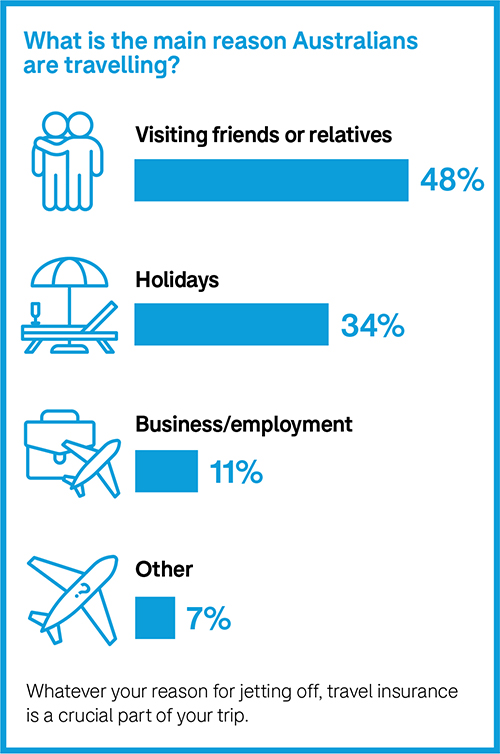
Reciprocal healthcare Australia has reciprocal healthcare agreements with several countries: Belgium, Finland, Italy, Malta, the Netherlands, New Zealand, Norway, the Republic of Ireland, Slovenia, Sweden and the United Kingdom. If you have Medicare, you can get subsidised treatment for essential services only in these countries, which often leads people to ask whether they still need travel insurance. The answer is yes, for the following reasons. You’re usually only covered for urgent care that can’t wait until you get home. If you’re very ill, travel insurance can pay for a medical escort to bring you home to Australia. You still may have to pay fees for treatment and medication. For example, in New Zealand reciprocal health care doesn’t cover you for free or subsidised care by a general practitioner or ambulance. Travel insurance can cover you for cancellations, delays, stolen items and more.
Remember to take your Medicare card with you. You’ll need it, along with your passport, to prove you’re eligible for reciprocal health care. For more information, visit servicesaustralia.gov.au .
Marco* had breathing difficulties on his way home from Europe, causing his flight to be diverted to the UAE. Hospitals in the UAE won’t admit you unless you have insurance or can pay an upfront fee. Marco’s family had to pay thousands of dollars for his treatment. *To protect privacy we have changed names and some details
Do you need domestic travel insurance?
Most of us already have medical cover at home, be it Medicare or private health insurance or both. But there are still a few key reasons to consider domestic travel insurance.
- Cancellation: If you’ve spent a lot on your holiday, then it’s not too much extra to buy travel insurance in case of the unforeseen.
- Baggage cover: If you’re travelling with valuables, think about whether you want them covered for theft, loss or damage.
- Car hire excess: You can save money using travel insurance to cover your collision damage excess, rather than paying the car hire company’s extra charge.
Does international travel insurance cover COVID-19?
Many travel insurers now offer limited cover for COVID-19, but the available cover varies quite a lot. Some policies only cover medical and repatriation costs if you get COVID-19 overseas, while other policies provide limited cover for cancellation costs in addition to medical and repatriation costs.
You should always check the details of your insurance coverage, particularly how it applies to COVID-19 and travel disruptions.
Over 90% of travellers will look for insurance that covers them for cancellation and medical expenses caused by COVID-19.
If you’re planning to go on a cruise, be extra careful. Some travel insurers may not offer COVID-19 cover for multi-night cruises or they may restrict the cover provided on cruises.
Also, don’t rely on the travel insurance on your credit card unless you check it closely – it may not cover claims related to COVID-19.
There are cooling-off periods for COVID-19 cancellation cover, so it’s best to buy your travel insurance at the same time as you book your trip. Some insurers may only cover cancellation if you test positive to COVID-19 and the policy was purchased more than 21 days before your scheduled departure date.
Make your travel plans COVID-safe
You need to be prepared for your travel plans to be interrupted at short notice. As travel insurance may not protect you from government border closures, general lockdowns or quarantine requirements in your destination country, the key is to book only with providers that allow you flexibility should things change.
- Check the rules for travelling to your destination. For example, are there any entry requirements? What are the vaccination requirements? And what type of travel insurance do you need?
- Read the terms and conditions of your airline, accommodation and travel tours before you book. Will they refund you if you can’t travel due to COVID-19? If they only offer a reschedule or a credit, will you be in a position to redeem the credit in future?
- You can book flexible tickets for flights but be aware you usually have to pay the difference between the prices for the tickets you bought and the new tickets. So changing your flight dates at short notice can be very expensive.
- If you book through a travel agent or booking site, what are their terms and conditions? Will they refund you or provide a credit? Are there cancellation fees?
- If you pay by credit or debit card (and you selected ‘credit’ when you paid), you may have access to credit card chargebacks if something goes wrong.
- Keep on top of the latest travel advice and requirements at smartraveller.gov.au . Travel restrictions can change at short notice.
- If you do have to cancel, your travel insurer will ask you to claim what you can back from travel providers first. Read the CHOICE advice on how to get your money back on travel cancellations and ask your travel insurer if you can get a refund or partial refund of your travel insurance premium.
You can buy travel insurance from a travel insurer, travel agent, insurance broker, credit card provider, or even from your health, home or car insurer.
You can buy travel insurance online (direct from the insurer’s website, from a comparison site or through an airline booking site), over the counter or over the phone.
Buy travel insurance as soon as you know your travel dates. That way you’re covered if your trip is cancelled before you even leave or if you’re unable to travel at all.
You can certainly buy travel insurance quicker than it will take you to read this guide, but do you know what you’ll be covered for? Will you be covered if you trip over after having a drink? If you crash your scooter in Thailand? If you lose your wallet during a stopover? If you need to isolate because you contract COVID-19?
There are a lot of ‘what ifs’ to consider, depending on where you’re going and what you’ll be doing, so it’s worth reading the product disclosure statement (PDS) first to make sure you’ll be covered.
Will you use it? Hopefully not, but research by Smartraveller found that one in 4 Australian travellers experienced an insurable event on their last overseas trip. Most common insurable events Flight or tour cancelled Flight delayed more than 12 hours Received medical treatment Lost, damaged or stolen luggage Missed a connecting flight Lost, damaged or stolen cash or personal items Forced to cancel trip before departure What if the insurers don’t pay out? Australian travellers lodged almost 300,000 insurance claims in 2018–19, the last financial year before COVID-19 travel bans. Almost 90% of those were paid out. Top four reasons for declined claims Due to policy exclusions, or not included in the policy conditions Claim amount was below the excess Claim was due to a pre-existing medical condition Claim was for an item that was stolen while it was unattended
1. Where are you going?

The level of cover and the cost of travel insurance can vary depending on the region you’re travelling to, and some risks may be of greater concern than others. Not all travel insurance policies cover COVID-19 and other pandemics or epidemics such as SARS. And not all policies cover you for changing your plans due to a riot or civil commotion, for example. Travel insurance also may not be available for countries with travel alerts.
- Look up your destination on smartraveller.gov.au and make sure you’re aware of any risks or safety advice.
- Buy a policy that covers you for every country you’re travelling to or transiting through. If you’re going to Europe via a one-night stopover in the US, then get cover for the US and Europe. Usually a worldwide policy will cover this.
86% of travellers say they’re more cautious after the COVID-19 pandemic about travelling to places where it could prove harder to return home in a crisis.
You need different cover for different regions
Insurers sometimes apply policies to regions rather than having a policy for each destination.
Asia Pacific: Destinations such as New Zealand, Bali, Fiji and Papua New Guinea.
Asia: Destinations such as India, Indonesia, Thailand, Singapore and Malaysia.
Europe: Destinations such as the United Kingdom, Ireland and Western Europe.
Worldwide: All of the above as well as regions such as North America, South America, Japan and Africa.
These definitions differ for each insurer. For example, several insurers cover travel to Bali under their Pacific policy, while some will only cover travel to Bali under their Asian region policy.
2. How long are you going for?

Just a quick trip? Simply buy a standalone travel insurance policy for a set number of days.
Travel often? Consider an annual multi-trip policy or a credit card with complimentary travel insurance, but make sure it gives you the cover you need.
Tip: Annual multi-trip policies and credit card policies can restrict the length of each trip you take – anywhere from 15 to 365 days depending on your policy. Some allow you to pay for extra days.
3. What are you going to do there?

Cruising the open road on a moped? Carving up the ski slopes? Partying at a wedding? These things aren’t necessarily included in a travel insurance policy.
Scan the insurer’s list of included activities and those that you’ll have to pay extra for. And take it easy on the grog – if your alcohol or drug intake is the cause of an adverse event, it won’t be covered by your policy.
4. Are you taking any valuable items?

Do you need cover for a digital SLR camera or an expensive tablet or laptop? Cover for such valuables can vary from a few hundred dollars to thousands, and higher cover will often mean a higher premium.
Consider adding cover for portable valuables to your home insurance policy instead, but check on the excess and if the policy will cover you worldwide and not just in Australia.
Policies also vary when it comes to how they cover valuable items. Valuables in your check-in luggage often aren’t covered, while cover for baggage stored in your hire car is inconsistent. And baggage left unattended is never covered, which can include a bag that is stolen from the seat beside you in a restaurant while you’re looking the other way.
Make sure you have receipts for your valuables as travel insurance will not pay if you can’t prove you own them.
5. Do you have any medical conditions?

If you have a medical condition that existed before you bought your policy, it may not be covered. This can range from something as common as allergies or asthma through to diabetes, heart conditions and knee replacements.
If you’re not sure, the best thing to do is contact the insurer to ask whether they’ll cover your condition automatically or whether you need to do an assessment.
The Massoud family* was holidaying in Singapore when 13-year-old Nazreen had a recurrence of severe bronchitis, which had affected her in Australia before their trip. The family’s travel insurer refused to pay any hospital bills as Nazreen’s bronchitis was a pre-existing medical condition. As a result, the Massouds had to ask their friends to transfer the $17,000 they needed to cover Nazreen’s hospital expenses, additional accommodation and the cost of changing flights. *To protect privacy we have changed names and some details
It’s important to compare policies for cost and cover. Some travel insurance premiums increased by as much as 30% between March and June 2022.
Three-quarters (77%) of travellers are willing to pay more for insurance that covers pandemic-related claims.
The further out from your departure date that you buy travel insurance, the more you’re likely to pay for it, but you’ll be covered from the moment you buy your policy. For example, if you buy insurance 2 months before you fly, you effectively have cheap cover for any events that affect your travel plans in those 2 months.
If you pay for your trip in full 6 months in advance, but you only buy an insurance policy 2 weeks before you depart, you may not be covered for any cancellation costs if you contract COVID-19.
Left it until the last minute, or even later? Only a few insurers let you buy insurance once you’re already overseas (look for the ‘Have you already left Australia?’ checkbox when viewing policy options).
While not all policies offer online discounts, plenty do. Make sure you understand the policy and what it covers. Sometimes (but not always) a reduced price may mean reduced cover.
Tip: Check asic.gov.au/afslicensing to find out whether the agent has an Australian financial services (AFS) licence or is an authorised representative of a licence holder. Take the usual precautions when giving your credit card and other details over the internet.
Member discounts
Does your health, car or home insurance provider also sell travel insurance? Some companies give 10–15% discounts to existing members.
Shop around
Trying to negotiate with a website will probably get you nowhere, but if you’re buying over the phone or through a travel agent, give it a go. Travel agents pocket a commission when they sell you insurance, so if you find a better deal elsewhere, ask them if they can beat it.
Almost two-thirds (62%) of overseas travellers who buy insurance do so on or before the day of booking travel.
Use your credit card
Some credit cards come with ‘free’ travel insurance when you use them to buy a ticket, pay for other travel expenses or otherwise activate it (we say ‘free’ because you’ll pay a premium in fees for the card itself).
This type of insurance can sometimes be a money-saver, and the level of cover can be just as good or even better than standard insurance, but make sure it gives you the cover you need.
Compromise on cover
While good medical cover is always essential, you could save money on your premium by choosing a policy with lower or variable cover for cancellation, delays and lost baggage, especially if you aren’t spending big on your holiday or taking expensive items with you.
Have you read the Product Disclosure Statement (PDS)? According to research conducted in 2022, of those who bought travel insurance: 45% have skim-read the PDS 43% have read the PDS in detail 8% have left the PDS to another person on the policy to read 2% have not and will not read the PDS 2% don’t know
About that fine print
You’re about to click ‘buy’, so you may as well just tick this ‘I acknowledge I’ve read the product disclosure statement’ checkbox and bon voyage…
But wait – have you checked the fine print? In the insurance world, that ‘fine print’ is contained in the product disclosure statement, or PDS (that thing you said you’d read).
How to read the PDS
There are hundreds of policies out there and if you tried to read all the paperwork that comes with each policy, you’d have to extend your holiday just to recover.
If you don’t have time to read the whole PDS cover to cover, at least look for the following.
- The table of benefits is an overall summary of your cover.
- The policy cover section is essential reading and is generally split into ‘what we will pay for’ and ‘what we won’t pay for’.
- General exclusions are also essential reading – these are events that aren’t covered by any section of the policy.
- Pre-existing conditions can remind you of forgotten ailments and are essential reading for anyone with any kind of medical condition, no matter how mild.
- The word definition table might contain a few surprises – it’s a good place to check on the definition of a ‘relative’ or a ‘moped’, for example.
- The claims section lists some further pointers to be aware of (e.g. it’s a good idea not to admit fault or liability in the case of an accident) and the paperwork you may need to collect while you’re away if you need to make a claim, such as police reports.
- COVID-19 cover section – many policies have a special section listing medical, cancellation and other cover available for COVID-19.
- The 24-hour emergency assistance contact number (write it down and keep it handy).
The Weaver* family was relieved to have travel insurance when they needed to cancel their holiday. The family wanted to go skiing in New Zealand, but a few days before they were due to depart, 12-year-old Ruby had cold symptoms. A COVID-19 test showed she was positive. Ruby and her whole family had to isolate and their travel insurance paid their cancellation costs. *This is a fictitious but realistic example
The list of travel insurance disputes taken to the Australian Financial Complaints Authority (AFCA) reveals a battlefield of unread or misinterpreted terms and conditions. Between 1 July 2020 and 30 June 2021, AFCA received more than 2,000 travel insurance complaints related to COVID-19.
Not all travel insurance policies are the same, and the wrong policy can be almost as bad as none at all.
Peter* and his business partner had booked a business trip to South Korea and Japan from 21 February 2020 to 2 March 2020. On 20 February, Peter cancelled the trip on advice of his GP who said that due to the uncertainty of the extent of the COVID-19 outbreak, he should postpone the trip until it is safe to travel. Peter’s travel insurer denied his claim, saying the policy does not provide cover for cancellation due to medical advice. Peter made a complaint and AFCA ruled in his favour as COVID-19 had been publicly announced as an epidemic prior to Peter cancelling the trip and the doctor’s advice not to travel was prudent and reasonable. *To protect privacy we have changed names and some details
Checklist – Are you covered for COVID-19? Are your medical costs covered if you contract COVID-19? Are your extra expenses such as accommodation covered if you can’t travel or your stay gets extended because you or your travelling companion tests positive to COVID-19? What happens if you were going to stay with someone but they’ve contracted COVID-19? Or your accommodation or tour company gets closed down because of COVID-19? Are your additional expenses covered? If the Smartraveller alert level is raised to ‘Reconsider your need to travel’ or ‘Do not travel’ due to a COVID-19 outbreak at your destination after you took out travel insurance, are you covered if you cancel your trip? Are your cancellation costs covered if you can’t travel or can’t return on your booked flights because you or your travelling companion contracted COVID-19? Are you covered for cancellation costs if your business partner or a relative back home gets sick with COVID-19 and you need to return earlier than planned? If you’re planning to go on a cruise, be extra careful. Some travel insurers may not offer COVID-19 cover for multi-night cruises. Are you covered for claims caused by government travel bans, border closures, or mandatory quarantine or self-isolation requirements at your destination?
And what are the catches?
Cancellations, baggage and personal items, sports and activities.
This is the number one reason to buy international travel insurance. Look for the insurer’s benefits table, usually on the quotes screen online or near the front of their PDS, for a quick overview of what they’re offering. Most policies have an ‘unlimited’ sum insured.
Pre-existing conditions
Some insurers don’t cover pre-existing conditions at all. Some will only cover pre-existing conditions with an extra fee and sometimes a medical assessment. Some automatically cover pre-existing conditions listed in their PDS, although few will cover mental illnesses such as depression or anxiety.
Insurers exclude cover for certain pre-existing medical conditions and generally don’t provide cover for any illnesses or incidents that arise from these. This includes terminal illness or any illness that shortens your life expectancy as well as organ transplants.
Minor pre-existing medical conditions such as asthma, hypertension, diabetes, epilepsy, osteopenia and more are usually covered if:
the condition has been stable for more than 12 months
there is no planned surgery
you have not received treatment in the past 12 months.
Pre-existing condition spoiling your holiday plans? findaninsurer.com.au lists insurers that may provide cover for pre-existing conditions. Still having trouble finding cover? Enlist the help of an insurance broker.
Examples of conditions that usually need to be assessed before getting cover are coronary problems, lung disease, epilepsy, stroke or any surgeries in the last 2 years.
If in doubt, declare your condition to your insurer.
A disability shouldn’t prevent you from buying travel insurance, but it might make finding a good policy trickier and more expensive.
Is a disability a pre-existing condition?
It depends on the disability and the insurer. Many insurers will automatically cover travellers with limited mobility, cognitive impairments or vision/hearing impairments. But in some cases, this cover may come at an extra cost.
Check with the insurer, as some conditions will need to be assessed on a case-by-case basis.
Having trouble getting cover?
Under the Disability Discrimination Act, insurers must assess the actual risks, rather than make assumptions about disabilities. If you’re having trouble getting insurance, a letter from a medical professional might help, particularly if they can state that you’re not likely to need medical or hospital treatment while on your trip.
Cover for your equipment
If you’re travelling with a wheelchair, mobility aid or hearing aid, you’ll need to insure that as well. Check single item limits, which are usually between $750 and $1,000 per item. If you have a piece of medical equipment that exceeds this, you’ll need to specify it and insure it separately.
Many insurance policies exclude hearing aids, so check the fine print and take out extra insurance if necessary.
Cover for your carer
If you’re travelling with a carer, it’s a good idea to be on the same policy in case travel plans change for either of you – that way you’re both covered. If you have a paid carer, ask your insurer whether they’ll cover the cost of a replacement carer should yours be unable to travel.
Babymooning
If you’re travelling while pregnant, be sure to check the following.
- Are you covered for pregnancy complications? Some insurers don’t cover pregnancy at all.
- Up until which stage of pregnancy? Pregnancy complications are usually only covered up until a certain stage (often between 23 and 32 weeks, depending on the insurer).
- Childbirth: Not all insurers will cover childbirth. A premature birth in the US with intensive care and treatment could end up costing hundreds of thousands of dollars.
- IVF: Not all insurers will cover IVF pregnancies.
- Do you have to pay extra to be covered?
- Do you need medical approval to be covered?
Mental health
Many travel insurers won’t provide cover of any kind for hospitalisation, medication or missed travel caused by a mental health condition, whether that’s depression, anxiety or a psychotic episode.
Others will provide cover if you declare mental illness as a pre-existing condition and pay a higher premium. Check the PDS carefully; insurers may use different terms to describe the same mental health conditions, giving them wriggle room to deny a claim.
Insurers are highly unlikely to pay a mental health-related claim if they discover it was a pre-existing condition that you didn’t declare. The trouble is, an insurer might view a single visit to a therapist many years ago because of work stress, for example, as a pre-existing mental health condition.
Mental health and travel insurance have been a contentious issue for consumer rights groups including CHOICE – and it’s one that’s still evolving from a legal standpoint.
To find out if a travel insurance product includes mental health cover, check choice.com.au/travelinsurance , filtering for ‘mental illness related claims’. Then put the PDS under the microscope.
A woman in Victoria won a court case against her insurer after they declined her claim for the cancellation of an overseas trip due to depression. ‘We took out the travel insurance well in advance of the travel, and well before my depression. I was certainly under the impression that I was covered,’ she told CHOICE. ‘They just sent back a letter that said no.’ But her win (the Victorian Civil and Administrative Tribunal awarded her $4,292 for economic loss and a further $15,000 for non-economic loss) was an isolated ruling. It’s still being debated whether or not a general exclusion for mental health claims is legal.
Most policies have an age limit, ranging right up to the 100-year-old seasoned adventurer. There are quite a few catches for older travellers, though.
- Higher premiums: Insurers often charge older travellers more, and in some cases ‘older’ can be as young as 50.
- Higher excess: Travellers as young as 60 but more commonly over 80 may be subject to a higher excess because of their age. The normal excess of around $100 to $200 is often increased to an excess of $2,000 to $3,000 for travellers 80 years and over for claims that relate to injury or illness.
- Restricted conditions: Subject to medical assessment’, ‘reduced medical cover limits’, ‘reduced travel time’, ‘policy to be purchased 6 months in advance’ – all of these conditions can apply to travellers over a certain age.
You’ll probably want to be covered if your travel plans are cancelled for any reason, but be aware that insurers will come up with plenty of excuses to avoid paying up.
- Terrorism: Most insurers cover medical expenses but very few cover cancellation expenses in the event of terrorism.
- Pandemic or epidemic: Commonly excluded.
- Military action: Commonly excluded.
- Natural disaster: Covered more often than not.
- Travel provider/agent insolvency: Commonly excluded.
- Cancellation due to travel provider’s fault: Insurers commonly exclude cover for delays or rescheduling caused by the transport provider.
John* and his partner’s scheduled train service was delayed, seriously diverted, then terminated, which meant they missed their flight home by several hours. Re-booking fees, emergency accommodation and related fees cost them between $1,000 and $1,500, but the insurer wouldn’t pay the claim as it wasn’t in the policy. *To protect privacy we have changed names and some details
‘Unforeseen’
When an insurer refers to cover for ‘unforeseen circumstances’, it means something that wasn’t publicised in the media or official government websites when you bought the policy. Check the Smartraveller travel advice when you buy your travel insurance. If it became known before you bought the policy, you’re not covered. So the earlier you buy travel insurance, the more likely you are to be covered for the unexpected.
Exclusions and inclusions
When the Australian Financial Complaints Authority (AFCA) looks at a complaint about an insurer, they expect you to prove the claim is covered by the policy, while the insurer must prove the claim is excluded by the policy. Specifically, AFCA expects you to ‘establish on the balance of probabilities that you suffered a loss caused by an event to which the policy responds’. That is, do you have a valid claim?
This means that you need to understand if your claim is covered under the listed events of the policy, or that it is not specifically excluded by the policy.
If, for example, you have cover for COVID-19, you aren’t covered for every event caused by the pandemic, but just by what is specifically stated in the PDS.
Margaret and Peter* booked a cruise departing from Darwin in March 2021. Shortly before departure, the Northern Territory Government issued a directive no longer allowing cruises to depart from the NT. Margaret and Peter’s cruise company arranged for the cruise to depart from Broome and flew the passengers to Broome for a cost of $300 per person. As Margaret had bought a policy that included some cover for COVID-19, she made a claim for $600. But this was denied by her travel insurer and her subsequent complaint to AFCA was unsuccessful. AFCA said, ‘The cause of the loss was a government directive to not permit the cruise to operate through the NT port. The insurer’s policy provides no cover for these circumstances. It also excludes losses arising from government intervention, prohibition or regulation.’ *To protect privacy we have changed names and some details
Travel insurance and Smartraveller advice Smartraveller, managed by the Department of Foreign Affairs and Trade (DFAT), assigns an overall advice level to more than 175 destinations. This advice level can affect your travel insurance cover. The advice levels are: Level 1 – Exercise normal safety precautions. COVERED. Level 2 – Exercise a high degree of caution. COVERED. Level 3 – Reconsider your need to travel. CHECK. Level 4 – Do not travel. USUALLY NOT COVERED. Travel warnings can work in your favour. If an insurer excludes cover for an event, they may still cover you to change your plans in response to updated advice from Smartraveller. But beware when travelling to a destination that has a ‘Do not travel’ warning. Most standard policies won’t cover you for ‘Do not travel’ destinations, including for COVID-19. A week after a volcanic eruption made world news, Sameer* booked a trip to Bali. He assumed the emergency would be over by the time he was due to fly a month later. Unfortunately, the volcano continued to erupt and Sameer’s flight was cancelled. His insurer declined his claim because he’d bought the flight and insurance after Smartraveller issued a travel alert about the volcanic eruption, and after it had been in the news. *To protect privacy we have changed names and some details
Delays can be expensive, particularly if you have to pay for alternative transport or accommodation. And those extra expenses won’t always be covered.
- Transport delay is only covered after a certain number of hours, usually 6, but you may have to wait as long as 12 hours before your cover kicks in.
- Cover limits for transport delays are typically lower than other cover limits and are often limited per 24-hour period.
- Insurers often exclude cover for rescheduling caused by the transport provider but some may cover additional accommodation and travel expenses in this scenario for travellers who are en route.
Baggage cover varies widely, with travel insurance policies ranging from $0 to $30,000. So, if you’re not carrying expensive items, you may be able to save on your premium by selecting a policy that provides lower coverage.
- Individual items are subject to sub-limits that range from around $250 to as much as $5,000.
- Higher item limits usually apply for electronic items like laptops, cameras, smartphones and tablets.
- You can pay extra to specify items you want extra cover for (insurers are always happy for you to pay extra).
- Valuables locked in a car or checked in on an airline, train or bus may not be covered.
- Generally, any items left unattended may be excluded from cover, so keep your belongings close.
Jing* sat down to try on a pair of shoes in a busy London shoe shop, placing her handbag next to her on the seat. When she stood up to leave, she discovered her bag was gone. Her insurer refused to pay up because she had left her bag unattended in a public place. *To protect privacy we have changed names and some details
Lost luggage
If an airline loses your luggage temporarily and doesn’t compensate you for that loss, you may be able to claim expenses for clothing, toiletries and other necessities, depending on your policy.
- Cover usually only applies to luggage lost for more than 12 hours, though the minimum time limit varies per insurer, as does the level of cover.
- If your policy has an excess (a fee that’s deductible from your payout), remember that this applies once per claimed event, and items below the excess level can’t be claimed.
Angelo and Diane* tried to claim $112 for meals and drinks when their connecting flight to Hawaii was delayed by 8 hours. Although their policy technically covered them for the cost, they were liable for an excess of $250, so their claim was denied. *To protect privacy we have changed names and some details
If you don’t feel like paying the ‘extra insurance’ the car hire company charges, then use the collision damage excess cover in your travel insurance.
Tip: Stick with recognised car rental companies in this case since this cover only applies if the car hire company already has its own comprehensive insurance.
Do you have the right licence?
Some countries require you to have an international driving permit. If you have an accident while driving on the wrong licence (or breaking that country’s law in any other way), you may not be covered.
Cruise-specific insurance
Cruises aren’t automatically included in all travel insurance policies. If you’re going on a cruise, make sure you have the right cover.
The Department of Health says: ‘Cruise ships carry a higher risk for spreading disease compared to other non-essential activities and transport modes. COVID-19, influenza and other infectious diseases such as gastroenteritis spread easily between people living and socialising in close quarters.’
Check travel insurance policies to make sure medical cover for COVID-19 is included, as some policies exclude this cover. Erica* stumbled and broke her femur during stormy seas while on a cruise. Her insurer covered the cost of evacuation and a partial hip replacement at a hospital in Noumea. They also organised and paid for her son to fly to Noumea to help her recover and return home to Australia. Five months later, the well-travelled 82-year-old was boarding a plane to Croatia for her next (fully insured) adventure. *To protect privacy we have changed names and some details
Not leaving Australian waters?
You still need insurance. Doctors working on cruise ships don’t need Medicare provider numbers, so if they treat you, you can’t claim on Medicare or your private health insurance, even if you’re still in Australian waters.
Domestic travel insurance doesn’t cover medical costs, so you need either international travel insurance (check that it covers domestic cruises) or a domestic cruise policy.
Kerry* thought she’d done the right thing buying an annual multi-trip international travel insurance policy for a number of upcoming holidays, one of which was a round-trip cruise departing from and returning to Fremantle, Western Australia, with no port stops. When she had to cancel due to ill health, she discovered her policy wouldn’t cover her because the trip wasn’t considered an international one. *To protect privacy we have changed names and some details
When CHOICE compares travel insurers, we look at who covers which sports and adventure activities, such as skiing, ballooning, bungee jumping and scuba diving, to name a few.
But as always with insurance, the PDS may include some surprises. For example, several insurers we’ve reviewed will cover canyoning but they won’t cover abseiling, often a necessity in canyoning. Other policies in our comparison will cover abseiling, but not into a canyon.
If you’re planning on doing anything adventurous, check to make sure you’re covered. It’s not enough to simply look for the tick next to your chosen activity – you also need to check the definitions in the PDS.
Motorcycles and mopeds
Hiring a motorcycle or moped? Depending on which country you’re in, you might need a local or international motorcycle licence. You probably won’t be covered if you aren’t obeying the local law. And even if you are doing the right thing under local law, some policies still won’t cover you unless you have a motorcycle licence.
Are you wearing a helmet? Most countries say you need one by law, but that doesn’t mean it will be included in your hire. No helmet means no cover (in more ways than one).
Nhung* was injured after she rented a moped in Thailand only to find out the engine size was not covered by her insurance policy. Most insurers adopt the national standard for the definition of a moped – an engine capacity under 50cc. If the engine is bigger than that, it’s a motorcycle and you’ll need an Australian motorcycle licence. *To protect privacy we have changed names and some details
Skiing and snowboarding
Some insurers cover skiing, often for an extra premium, but not so many cover skiing off-piste (away from the groomed runs). So, if you’re tempted to slide off the beaten path next time you hit the slopes, make sure you have a policy that covers off-piste ski runs (or pay for the optional extra cover).
Otherwise, if you run into a tree and have to be evacuated from the mountains, you may need to think about selling your home to pay for it.
It’s worth remembering that travel insurance only covers overseas costs. So if you break a leg while you’re abroad, your insurer will likely pay your hospital fees, but they won’t cover your ongoing physiotherapy once you’re back home.
Marianna* fractured her leg in 3 places while skiing with her partner and children in Japan. Because the family had bought additional cover for winter sports, they were reimbursed $35,466 for medical expenses, additional transport and accommodation, the cost of a nanny to look after the children, and business class flights back to Australia. *To protect privacy we have changed names and some details
Alcohol and drugs
Overdoing it on vodka and float-tubing down a river isn’t likely to be covered by any policy. Insurers simply won’t pay for costs arising from you being under the influence of alcohol or drugs (except where taken under the advice of a doctor).
Even one or 2 drinks could be enough of an excuse for insurers to get out of paying.
Relatives can be relative Many policies cover the costs to travel home if one of your relatives dies or becomes sick. Bear in mind: an insurer’s definition of a ‘relative’ may differ from yours cover is usually dependent on the age of that relative, so the death of your 84-year-old grandma may not be covered your relatives are subject to the same pre-existing condition exclusions as you, so if your 84-year-old grandma died from a known heart condition, you may not be covered. you may be able to apply for your relative’s pre-existing condition to be assessed before you buy the policy. cover is limited to relatives that live in Australia, or in some cases New Zealand. So if your 84-year-old grandma is in China, you won’t be covered to fly there for her funeral. Amanda* and her husband had booked an overseas diving trip, but shortly before the trip Amanda’s mum passed away from pneumonia. They cancelled their trip and incurred cancellation costs and lost deposits of nearly $13,000. As the death of a parent was covered in their policy, Amanda made a claim. Their insurer denied the claim as Amanda’s mum lived in the United States and was undergoing treatment for lung cancer, so the insurer concluded that her death was caused by a pre-existing condition. *To protect privacy we have changed names and some details
So you’ve booked and paid for your holiday through a travel agent, but then the travel agent goes broke. You’ll get your money back, right? Not necessarily.
Only a few insurers will cover you for the insolvency of a travel provider, and that includes hotels, airlines and other transport companies that might go broke overnight (remember Ansett?). But there are a few ways to safeguard your hard-earned holiday.
- Check whether your insurer covers you for insolvency.
- Check whether your travel agent has insolvency insurance (this isn’t compulsory, so only some will have it).
- Pay with your credit card. Some banks allow a chargeback if you pay for something on your credit card and don’t end up actually getting it.
Tip: Don’t accept any dodgy contract terms that require you to give up your chargeback rights.
2 out of 3 travellers assume their travel insurance will cover insolvency, but in 2017 less than a third of insurers actually provided this cover.
Credit card travel insurance
Some credit cards come with complimentary travel insurance. They’ll cover you for all the usual things like medical emergencies, cancellation and protection for baggage and items. But they do differ from standalone policies, so it’s essential you check the fine print.
- Fees: You’ll pay a premium for these credit cards, usually between $100 and $450 per year.
- Excess: The excess on credit card policies tends to be fixed at a higher rate (usually around $250), whereas it’s more variable on standalone policies.
- Age limits: Some credit card policies have no age limit, which can be handy for older travellers.
- Regions: Credit card travel insurance is not based on location, which means you can travel from Europe to the US without having to worry if your policy covers both areas. Bear in mind though that some regions (such as countries under United Nations embargo) may be excluded, and sometimes with US underwriters, travel to Cuba is excluded.
- Baggage cover: Credit card insurance often offers higher coverage for baggage loss and damage.
- Trip duration: Credit card insurance policies vary in how many days of coverage they’ll give you per trip – anywhere from a few weeks to 365 days – so check your limit if you’re going on a long holiday.
- Pre-existing conditions: Chances are your credit card insurance won’t automatically cover your pre-existing condition. You’ll need to call your insurer and see if you need to pay an extra fee or premium.
- Domestic travel: Credit card insurance doesn’t apply to domestic travel, although some cards will reimburse expenses associated with domestic flight delays and missed connections to international flights.
- Making a claim: You may not be able to claim reimbursement unless you pay for purchases (such as emergency items after a baggage delay) with the same credit card.
27% of travellers who plan to buy travel insurance will get it through their credit card.
Is it activated?
Credit card insurance usually activates when you buy your air tickets (or sometimes other transport or accommodation expenses) using your card.
- Policies require a minimum spend to activate – usually around $500. So if you scored your tickets on sale for $499, you won’t be covered.
- If you want cover for your spouse or dependants, you must also buy their tickets on your card.
- Some policies only activate if you book a return ticket. A one-way flight, or even 2 one-way flights, will leave you uninsured.
- Some banks require you to notify them in order to get full coverage for each trip. While base coverage will still give you emergency medical treatment, you might not get coverage for property damage or luggage delays. Check whether you need to do anything to activate any extra features.
- Some cards will cover you if you use rewards points to buy your tickets. Others won’t.
Is it worth it?
If you already have a credit card and use it regularly, the free comprehensive travel insurance on your card can save you money. And if you’re a regular traveller without a credit card, it’s worth considering if you travel at least once a year or every second year internationally.
David* booked a trip to North America for himself and his family, including his 11-year-old daughter Petra. The trip was cancelled because Petra got pneumonia. Unfortunately, David only activated his credit card travel insurance about an hour before the family was scheduled to fly out of Australia. The travel insurer denied his claim for cancellation costs because he knew about his daughter’s illness when he activated the policy. *To protect privacy we have changed names and some details
Have you been knocked back on an insurance claim and want to dispute it?
Internal dispute resolution
Complain to the insurer first. They’ll usually keep you up to date about the progress of your complaint every 10 business days.
Once you’ve lodged your case and all the supporting information and documents, the insurer has 45 days to complete its internal dispute resolution process.
External dispute resolution
If you aren’t happy with the insurer’s decision, you can take your complaint to the Australian Financial Complaint Authority (AFCA). They’ll handle your case for free.
- The AFCA will mediate between you and the insurer to find a resolution.
- If mediation is unsuccessful, they may make a preliminary assessment or give a determination straight away on your dispute.
- A determination is legally binding on the insurer but not on you.
- There’s no appeal process with AFCA.
- For more information, visit afca.org.au .
Legal action
If you’re unhappy with the AFCA determination, you might want to consider taking legal action against the insurance company.
Keep your travel insurance details with you at all times while on your trip and share them with family or friends before you leave.
Related content
No matter who you are, where you're going and what you're doing, get travel insurance. Learn how to choose a policy that's right for you.
This page provides mature travellers with information to prepare for a hassle-free journey. Properly preparing before you travel will help you have a safe trip.
Browse our general advice pages on a range of travel topics, to learn what you need to know before you go.

- " id="mainPhoneNumber">
- Annual Travel Insurance
- Cruise Travel Insurance
- Family Travel Insurance
- Seniors Travel Insurance
- Ski Travel Insurance
- Budget Direct
- Fast Cover Travel Insurance
- Insure4Less
- InsureandGo
- Simply Travel Insurance
- Ski-Insurance
- Travel Insurance Saver
- Travel Insuranz
- Wise Traveller
- Zoom Travel Insurance
- See more companies...
- Travel Insurance Tips
- Covid-19 Help
- Read Reviews
- Write a Review

Please Note - If you are cruising around Australia you need to select Pacific. With Regions, variances can apply for Bali, Indonesia, Japan and Middle East. You are not required to enter stop-over countries if your stop-over is less than 48 hours.
If you don’t know where you’re traveling to within the next 12 months, choose Worldwide to ensure you’re covered no matter where you go. If you’re travelling to multiple countries choose the region that you are visiting that is furthest away (excluding stopovers less than 48 hours). In most cases you will be covered for the closer regions as well. For example, if you choose Europe, you will also be covered in the Middle East, Asia and Pacific.
Worldwide means anywhere in the world
Americas means USA, Canada, South America, Latin America, Hawaii and the Caribbean
Europe means all European countries, including UK
Middle East refers to the area from Syria to Yemen; Egypt to Iran
Asia generally means Asia and the Indian subcontinent. For some insurers this excludes Japan*
Pacific means the South West Pacific, Australia and Indonesia/Bali*. Select Pacific for domestic cruises in New Zealand waters
New Zealand means domestic travel within New Zealand only
*Note: Variances apply for Bali, Indonesia, Japan and Middle East. Check that your destination is covered once directed to your chosen insurer’s site.
Credit card travel insurance
Complimentary or 'free' credit card travel insurance is a popular feature which many travellers rely on for cover during their travels. Checking the fine print of your credit card travel insurance policy terms is essential - otherwise, you might find common exclusions leave you out of pocket.
What is credit card travel insurance?
Pros and cons of credit card travel insurance.
Here's the top four pros and cons of complimentary credit card travel insurance:
Most credit card policies are underwritten by the same companies as standalone policies, so you know legitimate claims will be paid.
Most credit card travel insurance policies specifically exclude pre-existing conditions from cover.
While standard travel insurance gets more expensive as you get older, there's no extra cost on credit card travel insurance policies.
Many cards have an age limit or restrictions once you hit 75 years of age. Trip duration is often limited of 1 to 6 months, so you might not be covered at all even though you've paid your annual fee.
You don't have to pay extra to be covered for places like Japan and the USA, which typically cost more with standalone policies due to .
If you're going skiing, riding a motorcycle, or partaking in adventure activities be sure to check the policy detail as they may be excluded.
You've already paid for your policy using your annual fees, so there's no additional cost to you.
Annual card fees can be hefty. Depending upon your trip details, a standalone policy may be cheaper than your credit card annual fee.

Activating credit card travel insurance
1. activation on purchase, 2. activation on value or percentage of trip purchases, 3. activation on flight purchase, 4. activation on notification.
You need to call your card provider or log in to their internet banking or app and notify them of your trip to activate the policy.
compare credit card travel insurance conditions
The information provided is factual at the time of writing and general in nature. We have not considered your personal circumstances. Eligibility requirements and terms and conditions for cover are subject to change from time to time. Please refer to your credit card provider and the latest policy wording prior to your travels.
Will credit card insurance cover you?
Spouse or family members, trip length.

what credit card travel insurance may not cover
Pre-existing conditions, holiday activities, high-value items, what credit card travel insurance covers, overseas emergency medical treatment, cancellation fees and lost deposits, luggage and personal effects, public liability, credit card travel cover faqs, is credit card travel insurance any good.
Whether credit card travel insurance is as good as or better than standalone travel insurance depends entirely on you and your circumstances. If you're going for a short trip, you've paid for your flight on your card, and you have no pre-existing medical conditions, taking advantage of 'free' credit card travel insurance might be a winner. But if you're going for a while, doing any adventurous activities, or you're got existing health issues, a standalone product may offer you the coverage you're looking for.
Which Australian credit cards come with travel insurance?
Not every credit card comes with travel insurance. Complimentary travel insurance is typically offered on premium credit or rewards cards that have higher annual fees. Check your policy documents for details or contact your bank. You can also check the table above for some of the more popular credit cards.
What is the best credit card for travel insurance?
The benefits you get with credit cards varies based on the type of card you have, the policy provider and your individual circumstances, so there isn’t actually a “best” credit card for travel insurance. Our table lists Australia's premium cards that provide travel insurance and outlines any activation criteria.
Can I cover my medical conditions with my credit card cover?
In most cases, pre-existing medical conditions will not be covered by travel insurance that comes with your credit card, but you may be able to get cover for this by contacting the insurer and paying an additional premium. You will need to check the Product Disclosure Statement (PDS), also known as policy wording to find out whether pre-existing medical conditions are covered. The alternative is a standalone travel insurance, learn more about covering your medical conditions.
Am I covered if I go skiing?
Like all insurances, some limitations apply to the travel insurance that comes with your credit card or rewards card and skiing is often one of them. Winter sports activities such as skiing and snowboarding are often excluded from credit card travel insurance, so if you're planning on hitting the slopes you should contact your provider to ensure that you have adequate cover for your planned activities. If not, opt for a standalone ski insurance policy.

Crystal Moran
With a research and journalism background, and certified in Tier 2 General Insurance General Advice, Crystal is passionate about investigating customers’ tricky travel questions and helping them find the answers they’re looking for. A writer and filmmaker whose favourite trips have been to film festivals in Cuba and South Korea, and campervanning around the USA, she loves getting to know new people and seeing a glimpse of the world through their eyes.
Compare Travel insurance

About compare travel insurance
Get advice from the best team in travel insurance. We help thousands of Australian's compare benefits and features from the country's leading insurers.

ask us about credit card cover
Have a question about credit card travel insurance? Give us a call, send us an email or slide into our DMs on Facebook and we'll be happy to help.

read travel insurance reviews
Want to see how different travel insurance policies fair at claim time? Compare thousands of reviews from Aussie travellers.

Travel Insurance Extraordinaire At Your Service
Need some help? Use the search box below to find answers to all those tricky questions. We’ve got heaps of travel insurance tips to help you get the best policy for your upcoming holiday!
Our Travel Insurance Comparision Helps You
Save time, worry and loads of money.
Stay up to date with our latest news, deals and special offers.
Your privacy is important to us.

Comparetravelinsurance.com.au is Australia’s leading comparison site solely focused on travel insurance.
Our comparison is a free service that allows users to compare quotes in a few simple steps based on limited personal criteria. Comparisons supplied are not a recommendation or opinion about the suitability of a policy for a user. Comparisons are default ranked according to price and users have the ability to sort by popular cover levels. Whilst we compare a vast range of policies, we do not compare all providers in the market. This site compares the following brands: 1Cover, AllClear, Budget Direct, Downunder, Fast Cover Travel Insurance, Insure4Less, InsureandGo, iTrek, Simply Travel Insurance, Ski-Insurance, Travel Insurance Saver, Travel Insuranz, Wise Traveller, Zoom Travel Insurance . The directors and shareholders are common with companies i-Trek Pty Ltd, Zoom Travel Insurance and 1Cover Pty Ltd including it’s subsidiary brand Ski-insurance. CoverDirect takes all reasonable care when preparing this information but does not warrant its accuracy. Pricing information is supplied by the providers who participate on this site and should be verified with the insurer before you purchase. This site links users to the website of the provider to verify quotes and access the relevant PDS to understand what is, and is not, covered by a policy prior to purchase.
CoverDirect Pty Ltd owns and operates this website under AFS Licence 383590. Located at Level 12, 338 Pitt Street, Sydney, NSW 2000 Australia.
For further information view our FSG and Terms of Use . Contact us by calling 1300 659 411.
Loading Quotes...

Please login or register to continue. It'll only take a minute.

Login with Facebook
Login with Google

- There was an error logging in, please try again.
Enter your email and password
- There was an error on your registration, please try again.
Don't you have an account?
Just checking you are a human

- Credit Cards
- All Credit Cards
- Find the Credit Card for You
- Best Credit Cards
- Best Rewards Credit Cards
- Best Travel Credit Cards
- Best 0% APR Credit Cards
- Best Balance Transfer Credit Cards
- Best Cash Back Credit Cards
- Best Credit Card Sign-Up Bonuses
- Best Credit Cards to Build Credit
- Best Credit Cards for Online Shopping
- Find the Best Personal Loan for You
- Best Personal Loans
- Best Debt Consolidation Loans
- Best Loans to Refinance Credit Card Debt
- Best Loans with Fast Funding
- Best Small Personal Loans
- Best Large Personal Loans
- Best Personal Loans to Apply Online
- Best Student Loan Refinance
- Best Car Loans
- All Banking
- Find the Savings Account for You
- Best High Yield Savings Accounts
- Best Big Bank Savings Accounts
- Best Big Bank Checking Accounts
- Best No Fee Checking Accounts
- No Overdraft Fee Checking Accounts
- Best Checking Account Bonuses
- Best Money Market Accounts
- Best Credit Unions
- All Mortgages
- Best Mortgages
- Best Mortgages for Small Down Payment
- Best Mortgages for No Down Payment
- Best Mortgages for Average Credit Score
- Best Mortgages No Origination Fee
- Adjustable Rate Mortgages
- Affording a Mortgage
- All Insurance
- Best Life Insurance
- Best Life Insurance for Seniors
- Best Homeowners Insurance
- Best Renters Insurance
- Best Car Insurance
- Best Pet Insurance
- Best Boat Insurance
- Best Motorcycle Insurance
- Travel Insurance
- Event Ticket Insurance
- Small Business
- All Small Business
- Best Small Business Savings Accounts
- Best Small Business Checking Accounts
- Best Credit Cards for Small Business
- Best Small Business Loans
- Best Tax Software for Small Business
- Personal Finance
- All Personal Finance
- Best Budgeting Apps
- Best Expense Tracker Apps
- Best Money Transfer Apps
- Best Resale Apps and Sites
- Buy Now Pay Later (BNPL) Apps
- Best Debt Relief
- Credit Monitoring
- All Credit Monitoring
- Best Credit Monitoring Services
- Best Identity Theft Protection
- How to Boost Your Credit Score
- Best Credit Repair Companies
- Filing For Free
- Best Tax Software
- Best Tax Software for Small Businesses
- Tax Refunds
- Tax Brackets
- Taxes By State
- Tax Payment Plans
- Help for Low Credit Scores
- All Help for Low Credit Scores
- Best Credit Cards for Bad Credit
- Best Personal Loans for Bad Credit
- Best Debt Consolidation Loans for Bad Credit
- Personal Loans if You Don't Have Credit
- Best Credit Cards for Building Credit
- Personal Loans for 580 Credit Score Lower
- Personal Loans for 670 Credit Score or Lower
- Best Mortgages for Bad Credit
- Best Hardship Loans
- All Investing
- Best IRA Accounts
- Best Roth IRA Accounts
- Best Investing Apps
- Best Free Stock Trading Platforms
- Best Robo-Advisors
- Index Funds
- Mutual Funds
- Home & Kitchen
- Gift Guides
- Deals & Sales
- Sign up for the CNBC Select Newsletter
- Subscribe to CNBC PRO
- Privacy Policy
- Your Privacy Choices
- Terms Of Service
- CNBC Sitemap
Follow Select
Our top picks of timely offers from our partners

Find the best credit card for you
Here are the 3 best chase balance transfer credit cards of 2024, save money with these chase credit cards that offer 0% introductory aprs on balance transfers..

Credit card interest rates are often higher than other financial products like personal loans or mortgages so it's best to pay off your credit card balance in full every month . However, that isn't always possible so many people may wind up with high-interest credit card debt. In these situations, taking advantage of a 0% balance transfer offer can reduce the interest you pay and help you pay off your credit card debt more quickly.
Chase is known for issuing some top travel credit cards , but it also has several cards that offer an intro 0% APR for balance transfers. Consider these Chase balance transfer credit cards if you're hunting for a balance transfer offer. (See our methodology for information on how we chose the best Chase balance transfer credit cards).
Best Chase balance transfer credit cards
- Best for long intro APR: Chase Slate Edge℠
- Best for cash back: Chase Freedom Unlimited®
- Best for rotating bonus categories: Chase Freedom Flex℠
Best for long intro APR
Chase slate edge℠, welcome offer.
Get an automatic review for a credit limit increase when you pay on time and spend $500 in your first six months.
0% for 18 months from account opening on purchases and balance transfers
Regular APR
20.49% - 29.24% variable
Balance transfer fee
Intro fee of either $5 or 3% of the amount of each transfer, whichever is greater, on transfers made within 60 days of account opening. After that, either $5 or 5% of the amount of each transfer, whichever is greater.
Foreign transaction fee
Credit needed.
Excellent/Good
Member FDIC. Terms apply. Information about the Chase Slate Edge℠ has been collected independently by Select and has not been reviewed or provided by the issuer of the card prior to publication.
- No annual fee
- Lower your interest rate by 2% each year: Automatically be considered for an APR reduction when you pay on time, and spend at least $1,000 on your card by your next account anniversary
- 3% foreign transaction fee
- No rewards program
Who's this for? The Chase Slate Edge℠ does one thing, and it does it well — reduce the interest you pay. Its longer-than-usual introductory APR offer makes it ideal for those seeking more time to pay off their balance.
Balance transfer offer : New cardholders are eligible for an intro 0% APR on eligible balance transfers and purchases for 18 months from account opening, then a 20.49% to 29.24% variable APR applies. This is one of the longest intro APR offers available and is especially useful since it applies to purchases, too.
An intro balance transfer fee of either $5 or 3% of the amount of each transfer (whichever is higher) applies to transfers completed in the first 60 days of account opening. After that, the balance transfer fee is $5 or 5% of the amount of each transfer (whichever is higher).
[ Jump to more details ]
Best for cash back
Chase freedom unlimited®.
Enjoy 4.5% cash back on drugstore purchases and dining at restaurants, including takeout and eligible delivery services, 6.5% cash back on travel purchased through Chase Travel, our premier rewards program that lets you redeem rewards for cash back, travel, gift cards and more; and 3% cash back on all other purchases (on up to $20,000 spent in the first year). After your first year or $20,000 spent, enjoy 5% cash back on travel purchased through Chase Travel, 3% cash back on drugstore purchases and dining at restaurants, including takeout and eligible delivery service, and unlimited 1.5% cash back on all other purchases.
Welcome bonus
INTRO OFFER: Earn an additional 1.5% cash back on everything you buy (on up to $20,000 spent in the first year) - worth up to $300 cash back!
0% for the first 15 months from account opening on purchases and balance transfers
3% of each transaction in U.S. dollars
Member FDIC. Terms apply.
Read our Chase Freedom Unlimited® review.
- Rewards can be transferred to a Chase Ultimate Rewards card
- Generous welcome bonus
- 3% fee charged on foreign transactions
Who's this for? The Chase Freedom Unlimited® is geared toward those who want to earn cash back on their everyday spending and still want access to a helpful intro APR offer.
Balance transfer offer : New card members receive an intro 0% APR for purchases and balance transfer for the first 15 months, after that a variable 20.49% to 29.24% APR applies. For the first 60 days of account opening, there's an intro balance transfer fee of 3% of the amount of each transfer ($5 minimum). After that, a standard balance transfer fee of $5 or 5% of the amount of each transfer applies, whichever is greater.
Best for rotating bonus categories
Chase freedom flex℠.
5% cash back on up to $1,500 in combined purchases in bonus categories each quarter you activate (then 1%), 5% cash back on travel booked through the Chase Ultimate Rewards®, 3% on drugstore purchases and on dining (including takeout and eligible delivery services), 1% cash back on all other purchases
Earn a $200 bonus after you spend $500 on purchases in the first 3 months from account opening.
Member FDIC. Terms apply. Information about the Chase Freedom Flex℠ has been collected independently by Select and has not been reviewed or provided by the issuer of the card prior to publication.
Read our Chase Freedom Flex℠ review.
- Opportunity to earn up to 5% cash back in select categories upon activation
- Bonus categories must be activated each quarter
Who's this for? The Chase Freedom Flex℠ is a great card for anyone who enjoys squeezing the most value out of their credit card thanks to its generous rotating quarterly bonus categories.
Balance transfer offer : New cardholders can take advantage of a 0% intro APR for the first 15 months on purchases and balances transfer, then a 20.49% to 29.24% variable APR applies. An intro balance transfer fee of either $5 or 3% of the amount of each transfer applies to transfers completed in the first 60 days. After that, the standard balance transfer fee is 5% of the amount of each transfer or $5, whichever is greater.
More on our top Chase balance transfer credit cards
The Chase Slate Edge℠ is a no annual fee card with several features that can help you pay less interest, but doesn't earn rewards.
Get an automatic review for a higher credit limit when you pay on time and spend $500 in the first six months.
Notable perks
With the Chase Slate Edge , you are automatically considered for a 2% APR reduction if you pay your monthly bill on time and spend at least $1,000 on the card before your next account anniversary (terms apply). While you'll want a plan to pay off your balance transfer before the interest kicks in, this feature can help you lower your APR compared to what you might pay with other credit cards.
This card's insurance benefits include purchase protection, extended warranty protection, roadside dispatch and rental car collision and theft coverage (secondary in the U.S.).
[ Return to card summary ]
The Chase Freedom Unlimited® is one of CNBC Select's top no-annual-fee cash-back credit cards with a unique intro bonus and a handful of useful benefits to complement its cash-back earnings.
- 6.5% cash back on travel booked through Chase Travel
- 5% back on Lyft rides (through Mar. 31, 2025)
- 4.5% cash back on dining
- 4.5% cash back at drug stores
- 3% cash back on all other purchases (on up to $20,000 spent in the first year)
Earn an additional 1.5% cash back on everything you buy (on up to $20,000 spent in the first year).
Cardholders can earn 5% cash back on Lyft rides through March 2025 and enroll for three complimentary months of DashPass (activate by Dec. 31, 2024). Purchases are also covered by a range of built-in protections like rental car collision damage insurance (secondary in the U.S.), extended warranty coverage, purchase protection and trip cancellation and interruption insurance.
While this is a cash-back credit card , you can boost the value of the rewards you earn by pairing this card with a Chase card that allows points transfers (such as the Chase Sapphire Preferred® Card ). By transferring the rewards you earn to travel partners like World Hyatt, United MileagePlus and Air Canada Aeroplan, you can potentially book luxury hotels and flights for fewer points.
The Chase Freedom Flex℠ packs a punch with generous rewards in bonus categories that change every quarter and an easy-to-earn welcome bonus.
- 5% cash back on the first $1,500 spent in categories that change each quarter, then 1% cash back (activation required)
- 5% cash back on travel booked through Chase Ultimate Rewards®
- 3% cash back on dining
- 3% cash back at drug stores
- 1% cash back on all other purchases
Earn a $200 bonus after spending $500 on purchases in the first three months from account opening.
Cardholders receive discounts and special perks with partners like Lyft and DoorDash. There are also many valuable built-in protections for a no-annual-fee card, including:
- Cell phone insurance
- Rental car insurance (secondary in the U.S.)
- Extended warranty coverage
- Purchase protection
- Trip cancellation and interruption insurance
When you have a Chase card that unlocks the ability to transfer Chase points to hotel and airline partners (like the Chase Sapphire Preferred® Card) , it increases the value of the Freedom Flex. So this isn't only a strong standalone rewards credit card , but it has synergies with other cards.
How to complete a Chase balance transfer
Chase typically charges a balance transfer fee from 3% to 5% with a $5 minimum. Before you complete a balance transfer , be sure the interest you save will outweigh the fee.
There are several ways to do a balance transfer with Chase. One of the best and easiest options is to complete a balance transfer when you apply for a card. When you do this, you'll be able to make the most out of your intro APR because any 0% interest timeframe you qualify for begins when you open the card.
If you want to perform a balance transfer with a Chase card you already have, you'll need to log in to your account and follow these steps:
- Click "Pay & Transfer"
- Then click on the "Transfer" dropdown menu
- Select "Card balance transfers"
You can then select any of your Chase cards from a dropdown menu and see what balance transfer offers are available.
Are Chase balance transfers worth it?
When you make a balance transfer, you'll generally pay a fee of 3% to 5% of the balance. To determine whether a balance transfer is worth it, calculate how much you would save in interest compared to how much you'd pay in transfer fees.
What is one disadvantage of a 0% interest balance transfer card?
Aside from the balance transfer fees, the biggest downside to a balance transfer is you'll have the same amount of credit card debt as before. If you don't have a plan, or the resources, to pay off your debt before the intro APR expires, you'll be stuck paying interest once again.
Do balance transfers hurt your credit?
A balance transfer doesn't directly hurt your credit score and could help improve your credit if you're able to pay down your debt. However, you'll want to keep in mind that your credit score will temporarily dip when you apply for new credit (including a balance transfer card).
Bottom line
The top balance transfer cards Chase issues offer intro APR periods of 15 to 18 months, and these intro APR offers also apply to purchases, making them even more useful. If you're interested in paying less interest , these are some of the best offers available. When you're in credit card debt, your primary focus should be repayment, not earning rewards, but the fact that some of the cards on this list earn rewards is a nice bonus.
Why trust CNBC Select?
At CNBC Select, our mission is to provide our readers with high-quality service journalism and comprehensive consumer advice so they can make informed decisions with their money. Every credit card article is based on rigorous reporting by our team of expert writers and editors with extensive knowledge of credit card products . While CNBC Select earns a commission from affiliate partners on many offers and links, we create all our content without input from our commercial team or any outside third parties, and we pride ourselves on our journalistic standards and ethics. See our methodology for more information on how we choose the best Chase balance transfer credit cards.
Money matters — so make the most of it. Get expert tips, strategies, news and everything else you need to maximize your money, right to your inbox. Sign up here .
Our methodology
To determine which Chase cards are best for balance transfers, CNBC Select analyzed the Chase credit cards with intro APR balance transfer offers. We compared each card on a range of features, including the annual fee, rewards, welcome bonus and balance transfer fee. We also considered additional perks, consumer protections, the application process when available and how easy it is to redeem rewards. However, when you're in credit card debt, your priority should be repayment, so we focused more on the cards that provide consumers with the cheapest ways to pay off their debt rather than the number of rewards they could potentially earn.
Catch up on CNBC Select's in-depth coverage of credit cards , banking and money , and follow us on TikTok , Facebook , Instagram and Twitter to stay up to date.

- AIG Travel Guard insurance review: What you need to know Ana Staples
- Here are the 8 best password managers Ryley Amond
- 5 things to avoid if you’re applying for a mortgage Kelsey Neubauer

IMAGES
VIDEO
COMMENTS
There are a number of Insurance benefits that come with American Express Cards, from travel insurance to shopping & purchase protection. Learn more today. ... (ABN 23 001 642 020, AFSL No. 239687) under a group policy of insurance held by American Express Australia Limited (ABN 92 108 952 085, AFSL No. 291313). ...
American Express Travel Insurance is issued and underwritten by Chubb Insurance Australia Limited ABN 23 001 642 020, AFSL № 239687 (Chubb) and distributed by American Express Australia Limited, ABN 92 108 952 085, AFSL № 291313 (American Express). Chubb and American Express only provide general advice and do not consider your objectives ...
Currently, Chubb Australia is the contact for any American Express travel insurance claim. For medical emergencies, it is advisable to contact Chubb Assistance as soon as possible, or some expenses may not be covered. Chubb Assistance 24/7: +61 2 9335 3492.
Your Travel Insurance cover now includes self-drive road trips where you spend $500 or more on accommodation on your American Express Card. ... (Chubb) under a group policy held by American Express Australia Limited ®, ABN 92 108 952 085, AFSL No. 291313 (American Express). Chubb and American Express only provide general advice and do not ...
American Express offers complimentary travel insurance on a range of cards in Australia, as well as insurance options for your shopping. These policies are all underwritten by Chubb and have the ...
Savvy Editorial Team. , updated on June 26th, 2023. Fact checked. Founded more than 170 years ago in the US city of Buffalo, American Express (also known as AMEX) provides travellers with travel insurance products alongside its usual suite of services for credit cards and corporate banking. In Australia, the company is headquartered in Sydney ...
5x on flights booked directly or with Amex Travel, 5x on hotels booked through Amex Travel, 1.5x points on eligible purchases in select business categories and eligible purchases of $5,000 or more; on up to $2 million of these purchases per calendar year), 1x on all other purchases. Terms apply. Trip cancellation, interruption and delay Insurance.
How to make an American Express Travel Insurance claim. You can submit your claim online via the Chubb Claims Centre for American Express. Alternatively, you can phone Chubb on 1800 139 149 ...
Australia is uniquely adventurous. Your travel credit card may cover parts of your planned trip, but you might consider purchasing additional travel insurance.
Covered amount. The maximum benefit amount for Trip Cancellation and Interruption Insurance is $10,000 per Covered Trip and $20,000 per Eligible Card per 12 consecutive month period. Coverage is ...
Age: 35 years old. Destination: Australia. Trip Length: 7 days. Trip cost: $2,000. You can see our quotes for basic travel insurance in the following table. The cheapest travel insurance plan ...
Product Choice. We compare heaps of policies for all types of travellers from some of Australia's most reputable travel insurers. We compare 25+ insurance brands including, 1Cover, Amex, Budget Direct, Insure and Go, Virgin Money, Zoom & more!
There are two main types of travel insurance you can buy from World Nomads for trips to Australia: the Standard and Explorer plans. We recommend the Explorer plan due to its higher levels of ...
Generous travel plans provide $2,500 and higher, per person, for baggage loss. With so many connecting flights to get to Australia, there's also a chance your luggage will arrive, but after you ...
Australia Post's Comprehensive Travel Insurance offers coverage for credit card fraud of up to $5,000, lost luggage insurance up to $12,000 (sub-limits apply on certain items) and no age limit ...
Baggage cover varies widely, with travel insurance policies ranging from $0 to $30,000. So, if you're not carrying expensive items, you may be able to save on your premium by selecting a policy that provides lower coverage. Individual items are subject to sub-limits that range from around $250 to as much as $5,000.
The Citi Rewards Credit Card is a high-ranking credit card according to Forbes Advisor Australia, scoring 4.5 stars on our analysis of the best credit cards on the market for Australians this year ...
2. Activation on value or percentage of trip purchases. some credit card travel insurance only applies if you've spent a certain value, like $250-$500, or a percentage amount (e.g. 50%, 100%) of travel expenses on your credit card. 3. Activation on flight purchase. Your trip is covered provided you've purchased a return flight on your credit card.
Yes, protection against risks in relation to Covid-19 are covered by Tick Travel Insurance's Top policy. The insurer accepts related cancellation and disruption claims, as well as medical claims ...
Investing in travel insurance is a good idea for any overseas trip. Travel insurance policies can help protect you from having to dive deep into your pockets, with many offering unlimited medical ...
As stated, WAS Travel Insurance works a little differently to most travel insurers. Its comprehensive policy is known as the 'Discovery Plan', which is available to those aged up to 99 years ...
Using a travel rewards credit card has long been celebrated as an easy strategy to travel the world for less. Consumers can apply for rewards credit cards and earn points and miles on everyday ...
After your first year or $20,000 spent, enjoy 5% cash back on travel purchased through Chase Travel, 3% cash back on drugstore purchases and dining at restaurants, including takeout and eligible ...